fantastic AAR so far, it should be interesting to see how the China situation plays out... the allies occupied the most populated regions, didn't they?
The Presidents: Hoover to Dewey (1929-1953)
- Thread starter Nathan Madien
- Start date
-
We have updated our Community Code of Conduct. Please read through the new rules for the forum that are an integral part of Paradox Interactive’s User Agreement.
You are using an out of date browser. It may not display this or other websites correctly.
You should upgrade or use an alternative browser.
You should upgrade or use an alternative browser.
Teep: Good lord, I certainly hope not.
The Soviet Union has no nukes right now.
Enewald: In an earlier update some pages back, I talked briefly about the Soviet takeover of Finland. So the unlucky Finns are now trapped behind the Iron Curtain.
Kurt_Steiner: Oh, I get it.
Sorry, Enewald. Helsinki is living under Communist rule.
Look on the bright side. Finland will be free again in four decades or so.
El Pip: I took Churchill's famous "Iron Curtain" speech and modified it to fit my game. Historically, Churchill delievered this speech in March 1946 in Fulton, Missouri. For the game, I delayed the speech until August 1947 and moved it to Dewey's alma mater: the University of Michigan.
You are right, El Pip. Since Churchill is still the Prime Minister, declaring that an iron curtain has cut off Eastern Europe carries a tad more weight.
trekaddict: Right now, Clement Attlee is the Leader of the Opposition.
Maximilliano: Thank you.
China will be covered in the next update.
By the way, Gerald Nye was replaced by George C. Marshall as Secretary of State in November 1947.
In addition, George S. Patton died shortly after World War Two ended. Dewey bumped Dwight D. Eisenhower up to Chief of Staff. Following Eisenhower's recommendation, Dewey appointed Omar N. Bradley as Chief of the Army.
12/21/09: In light of additional research, I have decided to add an totally new update which finishes up 1947.
--------------------------------------------------------------------------
Dewey Strikes Back
Churchill’s speech at Ann Arbor caused a sensation. Although the White House had approved the speech in advance, national reaction was quite negative. Editorials accused the Prime Minister of straining the already-difficult relationship between the Soviet Union and the United States. To journalist Walter Lippmann, it was an “almost catastrophic blunder.”
When Stalin heard the speech in Moscow, he said it was a “call to war.”
Dewey was stunned by all the criticism. He couldn’t understand why people “are acting as though we had declared war on the Soviets from an auditorium in Ann Arbor.”
During a press conference held a few days later, he staunchly defended “The Sinews of Peace”, telling reporters that the address “held no bombshell revelation nor did it expose any secrets. All the facts the Prime Minister discussed are facts that are already publically known. If nothing else, he was pointing out the obvious.”
As far as he was concerned, Churchill had put into words what the Administration was thinking. When Dewey first met Stalin at Yalta in February 1945, he was in awe of his Soviet counterpart. Now, his attitude was different: he saw Stalin as being nothing more than a gangster he might have dealt with during his crime-fighting days. “I don’t work with gangsters,” he stated during a cabinet meeting held on August 22nd. Dewey's approach to the Cold War would be to take a hard line against the Soviet Union and not back down.
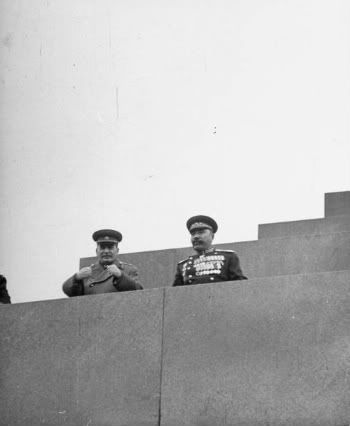
As summer faded into autumn, the President had other things to worry about than public reaction to a speech. On September 1st, John L. Lewis, the powerful President of the United Mine Workers of America, called for a nationwide coal strike. Four-hundred-thousand miners obeyed without question, such was the unswerving loyalty Lewis commanded of them. A shutdown of the coal industry not only affected every major industry, it also made weak the national energy supply in the face of the oncoming winter. Coming on the heel of the coal strike was the unprecedented national railway strike, which brought America's railroad service to a complete halt. For Dewey, enough was enough. Extremely frustrated and fed up with the unending criticisms, he was determined to reassert control and end these two major strikes...one way or another.
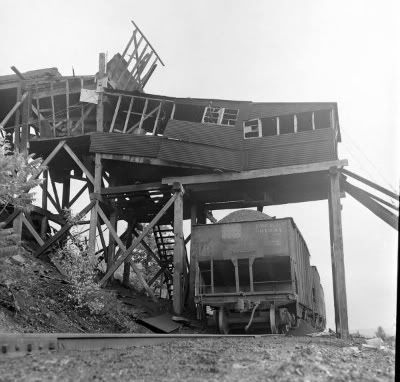
Instead of tackling one or the other, Dewey dealt with both the coal and railway strikes at the same time. When efforts to break the strikes peacefully failed, on October 17th, he unhesitatingly signed an executive order authorizing the Federal Government to seize and operate the coal mines and the railroads. “No one has the right to paralyze this nation,” the President firmly declared in his address to the nation shortly after ordering the use of force, “No one deserves to be without energy or rail service. As President, it is my duty, first and foremost, to protect and defend the United States of America from both external and internal threats. Acting therefore in the best interest of this nation, I have ordered the Government to take over the coal mines and railroads. Instead of remaining inactive during this difficult time, they will stay fully operational. The coal mines will be reopened and the railroads will be up and running again starting tomorrow. Until the proper settlements can be reached, this order will remain in effect. When private enterprises fail to act wisely, it is the obligation of the Government to step in and handle these matters.”
So it happened. The Army seized the coal mines and railroads, bringing them back on-line. This, in turn, exerted pressure on the strikers and the companies to reach settlements and bring the situation back to normal. In the end, the executive order paid off. On October 24th, one week after the Army took over, the railroad strike came to an end after an agreement was reached on wage increases. Three days later, the coal strike ended as well. Lewis signed a new contract with the coal operators which greatly benefitted the miners. By the beginning of November, control of the coal mines and railroads had once again been restored to civilian control. For Dewey, it was a major victory. His decisive action had restored order and demonstrated that he could handle the problems confronting him. All across the country, people widely praised his bold decision to intervene dramatically in the coal and railroad strikes.
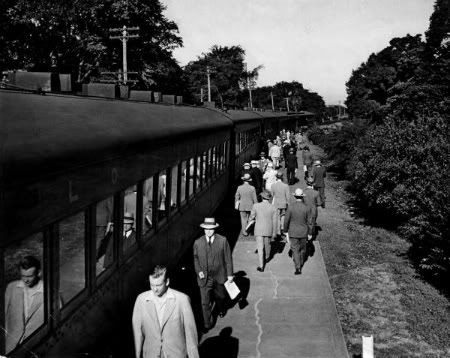
--------------------------------------------------------------------------
1948 Overview of the Dewey Administration
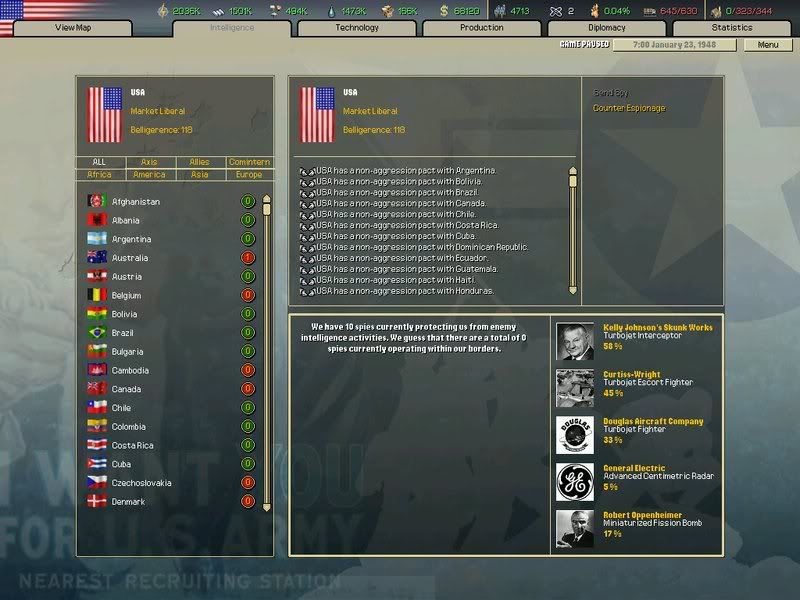
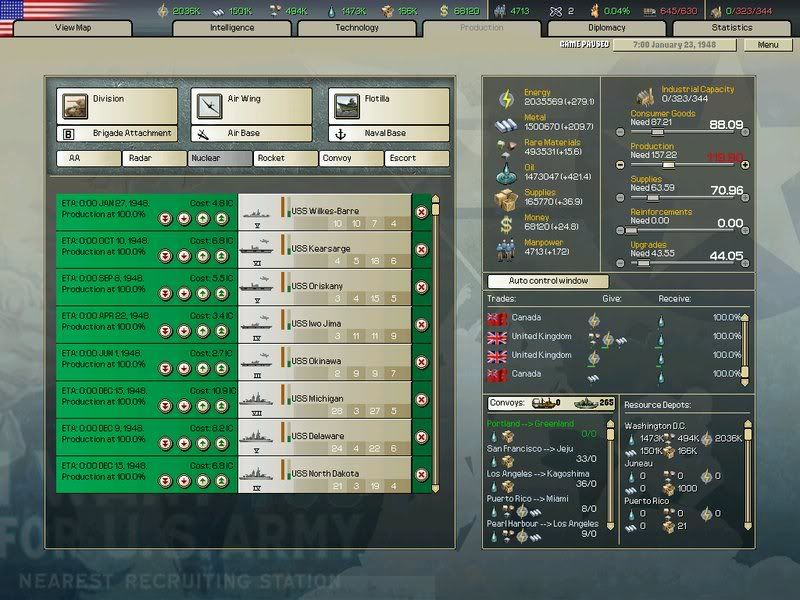
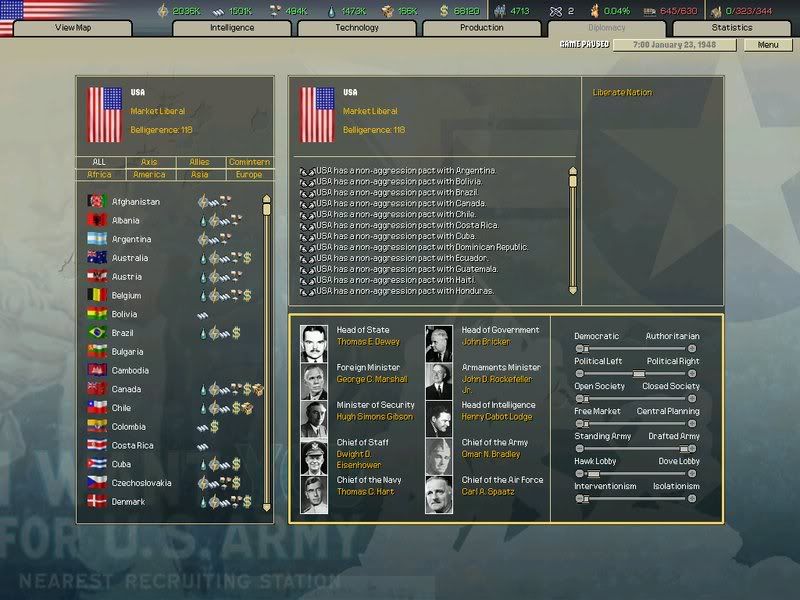
Army
Infantry: 38
Cavalry: 14
Motorized: 10
Mechanized: 4
Armored: 24
Paratroop: 7
Marine: 14
Mountaineer: 14
Garrison: 3
Headquarters: 9
Militia: 10
Navy
Battleship: 27
Light Cruiser: 35
Heavy Cruiser: 19
Battlecruiser: 11
Destroyer Group: 36
Carrier: 15
Light Carrier: 6
Submarine: 11
Transport: 28
Air Force
Fighter: 7
Interceptor: 9
Strategic Bomber: 8
Tactical Bomber: 11
Naval Bomber: 8
Close Air Support: 8
Transport: 8
--------------------------------------------------------------------------
Postwar Asia
In the aftermath of World War Two, the maps of Europe and Asia were redrawn along ideological lines. Like Europe, the Asian continent was carved in two to form a Communist half and a Democratic half. The Japanese Empire, which had dominated Asia for a decade, had been completely destroyed by the war. From the ashes emerged several new nations…including Japan herself.
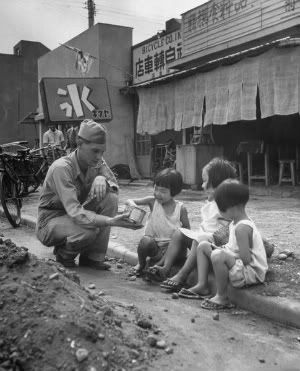
Under MacArthur’s supervision, the Land Of The Rising Sun underwent a radical transformation. Her days of having an empire were clearly over. Driven from the Asian mainland, Japan’s possessions were reduced to Amami, the Bonin Islands, Iwo Jima, and Okinawa (the rest of her Pacific islands all went to the Americans, with the Nationalist Chinese acquiring Formosa and the Soviets grabbing Southern Sakhalin). The aim of the American occupation of Japan was two-fold:
-Preventing the island nation from ever threatening her neighbors again.
-Transforming her into a Western-style Democracy.
Although Japan would become a Democracy, she was allowed to retain Emperor Hirohito. However, there was a catch. Instead of being an imperial ruler, Hirohito found his status strongly reduced to that of a ceremonial figurehead. Instead, it was MacArthur who called the shots.
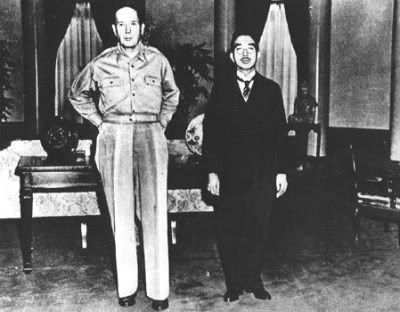
The United States would occupy Japan until 1954, when independence was restored to the island nation. During that seven-year period:
-An American-written constitution for Japan laid out a liberal democratic framework to replace the militaristic absolute monarchy system. Furthermore, Article 9 renounced war and limited the country to maintaining a small, purely defensive military.
-A major land reform was implemented, dismantling the landlord power structure and allowing farmers to purchase their own land instead.
-Shinto was abolished as a state religion.
-Education was reformed, moving the country away from the German system and more towards the American system.
-Several political parties were revived, including the Japan Socialist Party (today the Social Democratic Party), the Liberal Party (today the Liberal Democratic Party), and the Democratic Party of Japan.
Today, Japan is a major economic power with a very high standard of living. Except for the Peace Memorial Park in Nagoya (ground zero for the world’s first nuclear attack), little evidence remains of the utter devastation that once scarred what is now a very impressive landscape.

In addition to having a very close relationship with Japan, the United States maintains strong ties with Korea. Not surprising, considering it was the Americans who liberated the Korean people from Japanese control during World War Two. After the war, the Korean Peninsula underwent a transformation from being a Japanese colony to being a Democracy with a strong focus on the President – who was indirectly elected by the National Assembly. Syngman Rhee, an anti-Communist strongman, was elected the first President of the Republic of Korea. Today, Korea has one of the most powerful economies in Asia. In fact, her capital, Seoul, is the second-largest metropolitan city in the world.
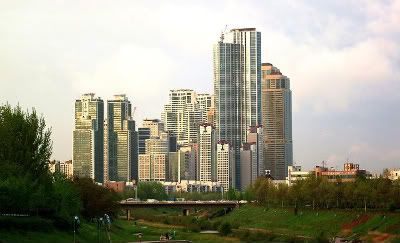
While Korea emerged from the war united, China emerged from the war as anything but. Indeed, four countries were carved out of the battered and blood-soaked landscape. As agreed to at the San Francisco Conference in November 1943, Chiang Kai-shek and his wife returned to Nationalist China after a long exile in the United States. For the second time in ten years, the country was reshaped by war. This time, Nationalist China consisted of land captured by the Americans and the British. This included the entire coastline between Korea and French Indochina. In re-establishing his government in Nanjing, Kai-shek wanted Nationalist China to become socially conservative – Democratic, but yet enforcing traditional values in order to keep the Chinese people “civilized and decent”. This way, he could keep a short-leash on his portion of China while maintaining the guise of Democracy. Not until Kai-shek’s death in April 1975 would Nationalist China (after being renamed the “Republic of China”) take on a more liberal tone. Today, the Republic of China is an economic powerhouse – perhaps even more so than Japan. Given how much influence China has in the Twenty-First Century, some have made the argument that Nanjing should be called “the capital of the world”.
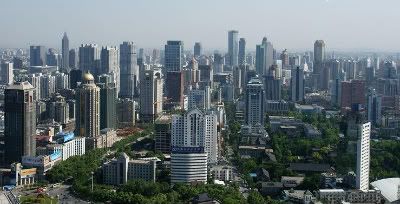
The rest of China, on the other hand, didn’t fare so well coming out of the war. Only neutral Tibet remained outside Soviet control. To ensure his iron-willed dominance of Asia went unchallenged, Stalin carved out what would collectively become known as "Red China". For starters, the former Japanese puppets of Manchukuo and Mengkukuo were wiped off the map. Manchukuo was carved in three: the southern coastline went to Nationalist China, the eastern half went to the Soviet Union, and the western half went to Mongolia. Mongolia also annexed Mengkukuo, greatly expanding her size. A treaty with Nationalist China would give Mongolia access to the Bohai Sea (part of the Yellow Sea), virtually eliminating her land-lock status. The Second World War gave Mongolia several reasons to celebrate.
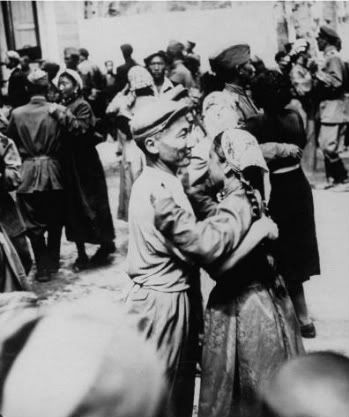
Of course, Stalin was not a forgiving man. That was made crystal clear when he quietly had Mao Zedong and others executed for having foolishly declared war on him in May 1945. Lin Bojiu, who had been in charge of armaments and had openly opposed going to war with the Soviets, was spared and instead was installed as the new leader of Communist China. In reality, he would be nothing more than the puppet ruler of a buffer state protecting the rest of Red China from Democratic forces to the east. Lastly, Stalin resurrected the Chinese warlord states of Sinkiang and Xibei San Ma. With permission from the British (who had more pressing issues to deal with than worthless land), the two countries then reoccupied Western China and their respective lands.
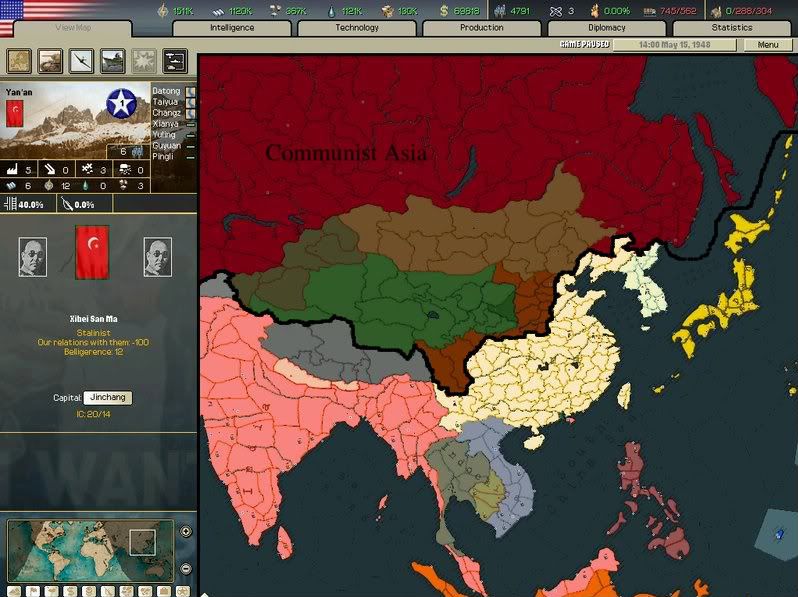
As for the other Allies, the British revived Bhutan and Nepal (which the Japanese had conquered during their westward advance). The French created a puppet state in Cambodia while re-exerting their control over Indochina. However, the French ran into trouble when they returned to Vietnam. The Viet Minh, a national liberation movement, wanted independence for Vietnam and didn’t take kindly to the return of the French occupation. They rose up in revolt, triggering the First Indochina War.
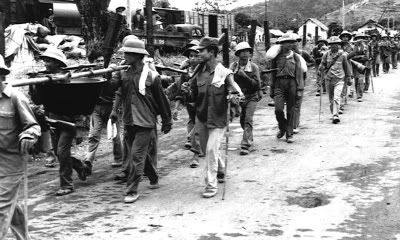
Although no one knew it at the time, this colonial rebellion would tragically lay the foundation for a much-larger Vietnamese war to follow…one that would deeply involve the United States.
The Soviet Union has no nukes right now.
Enewald: In an earlier update some pages back, I talked briefly about the Soviet takeover of Finland. So the unlucky Finns are now trapped behind the Iron Curtain.
Kurt_Steiner: Oh, I get it.
Sorry, Enewald. Helsinki is living under Communist rule.
Look on the bright side. Finland will be free again in four decades or so.
El Pip: I took Churchill's famous "Iron Curtain" speech and modified it to fit my game. Historically, Churchill delievered this speech in March 1946 in Fulton, Missouri. For the game, I delayed the speech until August 1947 and moved it to Dewey's alma mater: the University of Michigan.
You are right, El Pip. Since Churchill is still the Prime Minister, declaring that an iron curtain has cut off Eastern Europe carries a tad more weight.
trekaddict: Right now, Clement Attlee is the Leader of the Opposition.
Maximilliano: Thank you.
China will be covered in the next update.
By the way, Gerald Nye was replaced by George C. Marshall as Secretary of State in November 1947.
In addition, George S. Patton died shortly after World War Two ended. Dewey bumped Dwight D. Eisenhower up to Chief of Staff. Following Eisenhower's recommendation, Dewey appointed Omar N. Bradley as Chief of the Army.
12/21/09: In light of additional research, I have decided to add an totally new update which finishes up 1947.
--------------------------------------------------------------------------
Dewey Strikes Back
Churchill’s speech at Ann Arbor caused a sensation. Although the White House had approved the speech in advance, national reaction was quite negative. Editorials accused the Prime Minister of straining the already-difficult relationship between the Soviet Union and the United States. To journalist Walter Lippmann, it was an “almost catastrophic blunder.”
When Stalin heard the speech in Moscow, he said it was a “call to war.”
Dewey was stunned by all the criticism. He couldn’t understand why people “are acting as though we had declared war on the Soviets from an auditorium in Ann Arbor.”
During a press conference held a few days later, he staunchly defended “The Sinews of Peace”, telling reporters that the address “held no bombshell revelation nor did it expose any secrets. All the facts the Prime Minister discussed are facts that are already publically known. If nothing else, he was pointing out the obvious.”
As far as he was concerned, Churchill had put into words what the Administration was thinking. When Dewey first met Stalin at Yalta in February 1945, he was in awe of his Soviet counterpart. Now, his attitude was different: he saw Stalin as being nothing more than a gangster he might have dealt with during his crime-fighting days. “I don’t work with gangsters,” he stated during a cabinet meeting held on August 22nd. Dewey's approach to the Cold War would be to take a hard line against the Soviet Union and not back down.

As summer faded into autumn, the President had other things to worry about than public reaction to a speech. On September 1st, John L. Lewis, the powerful President of the United Mine Workers of America, called for a nationwide coal strike. Four-hundred-thousand miners obeyed without question, such was the unswerving loyalty Lewis commanded of them. A shutdown of the coal industry not only affected every major industry, it also made weak the national energy supply in the face of the oncoming winter. Coming on the heel of the coal strike was the unprecedented national railway strike, which brought America's railroad service to a complete halt. For Dewey, enough was enough. Extremely frustrated and fed up with the unending criticisms, he was determined to reassert control and end these two major strikes...one way or another.

Instead of tackling one or the other, Dewey dealt with both the coal and railway strikes at the same time. When efforts to break the strikes peacefully failed, on October 17th, he unhesitatingly signed an executive order authorizing the Federal Government to seize and operate the coal mines and the railroads. “No one has the right to paralyze this nation,” the President firmly declared in his address to the nation shortly after ordering the use of force, “No one deserves to be without energy or rail service. As President, it is my duty, first and foremost, to protect and defend the United States of America from both external and internal threats. Acting therefore in the best interest of this nation, I have ordered the Government to take over the coal mines and railroads. Instead of remaining inactive during this difficult time, they will stay fully operational. The coal mines will be reopened and the railroads will be up and running again starting tomorrow. Until the proper settlements can be reached, this order will remain in effect. When private enterprises fail to act wisely, it is the obligation of the Government to step in and handle these matters.”
So it happened. The Army seized the coal mines and railroads, bringing them back on-line. This, in turn, exerted pressure on the strikers and the companies to reach settlements and bring the situation back to normal. In the end, the executive order paid off. On October 24th, one week after the Army took over, the railroad strike came to an end after an agreement was reached on wage increases. Three days later, the coal strike ended as well. Lewis signed a new contract with the coal operators which greatly benefitted the miners. By the beginning of November, control of the coal mines and railroads had once again been restored to civilian control. For Dewey, it was a major victory. His decisive action had restored order and demonstrated that he could handle the problems confronting him. All across the country, people widely praised his bold decision to intervene dramatically in the coal and railroad strikes.

--------------------------------------------------------------------------
1948 Overview of the Dewey Administration



Army
Infantry: 38
Cavalry: 14
Motorized: 10
Mechanized: 4
Armored: 24
Paratroop: 7
Marine: 14
Mountaineer: 14
Garrison: 3
Headquarters: 9
Militia: 10
Navy
Battleship: 27
Light Cruiser: 35
Heavy Cruiser: 19
Battlecruiser: 11
Destroyer Group: 36
Carrier: 15
Light Carrier: 6
Submarine: 11
Transport: 28
Air Force
Fighter: 7
Interceptor: 9
Strategic Bomber: 8
Tactical Bomber: 11
Naval Bomber: 8
Close Air Support: 8
Transport: 8
--------------------------------------------------------------------------
Postwar Asia
In the aftermath of World War Two, the maps of Europe and Asia were redrawn along ideological lines. Like Europe, the Asian continent was carved in two to form a Communist half and a Democratic half. The Japanese Empire, which had dominated Asia for a decade, had been completely destroyed by the war. From the ashes emerged several new nations…including Japan herself.

Under MacArthur’s supervision, the Land Of The Rising Sun underwent a radical transformation. Her days of having an empire were clearly over. Driven from the Asian mainland, Japan’s possessions were reduced to Amami, the Bonin Islands, Iwo Jima, and Okinawa (the rest of her Pacific islands all went to the Americans, with the Nationalist Chinese acquiring Formosa and the Soviets grabbing Southern Sakhalin). The aim of the American occupation of Japan was two-fold:
-Preventing the island nation from ever threatening her neighbors again.
-Transforming her into a Western-style Democracy.
Although Japan would become a Democracy, she was allowed to retain Emperor Hirohito. However, there was a catch. Instead of being an imperial ruler, Hirohito found his status strongly reduced to that of a ceremonial figurehead. Instead, it was MacArthur who called the shots.

The United States would occupy Japan until 1954, when independence was restored to the island nation. During that seven-year period:
-An American-written constitution for Japan laid out a liberal democratic framework to replace the militaristic absolute monarchy system. Furthermore, Article 9 renounced war and limited the country to maintaining a small, purely defensive military.
-A major land reform was implemented, dismantling the landlord power structure and allowing farmers to purchase their own land instead.
-Shinto was abolished as a state religion.
-Education was reformed, moving the country away from the German system and more towards the American system.
-Several political parties were revived, including the Japan Socialist Party (today the Social Democratic Party), the Liberal Party (today the Liberal Democratic Party), and the Democratic Party of Japan.
Today, Japan is a major economic power with a very high standard of living. Except for the Peace Memorial Park in Nagoya (ground zero for the world’s first nuclear attack), little evidence remains of the utter devastation that once scarred what is now a very impressive landscape.

In addition to having a very close relationship with Japan, the United States maintains strong ties with Korea. Not surprising, considering it was the Americans who liberated the Korean people from Japanese control during World War Two. After the war, the Korean Peninsula underwent a transformation from being a Japanese colony to being a Democracy with a strong focus on the President – who was indirectly elected by the National Assembly. Syngman Rhee, an anti-Communist strongman, was elected the first President of the Republic of Korea. Today, Korea has one of the most powerful economies in Asia. In fact, her capital, Seoul, is the second-largest metropolitan city in the world.

While Korea emerged from the war united, China emerged from the war as anything but. Indeed, four countries were carved out of the battered and blood-soaked landscape. As agreed to at the San Francisco Conference in November 1943, Chiang Kai-shek and his wife returned to Nationalist China after a long exile in the United States. For the second time in ten years, the country was reshaped by war. This time, Nationalist China consisted of land captured by the Americans and the British. This included the entire coastline between Korea and French Indochina. In re-establishing his government in Nanjing, Kai-shek wanted Nationalist China to become socially conservative – Democratic, but yet enforcing traditional values in order to keep the Chinese people “civilized and decent”. This way, he could keep a short-leash on his portion of China while maintaining the guise of Democracy. Not until Kai-shek’s death in April 1975 would Nationalist China (after being renamed the “Republic of China”) take on a more liberal tone. Today, the Republic of China is an economic powerhouse – perhaps even more so than Japan. Given how much influence China has in the Twenty-First Century, some have made the argument that Nanjing should be called “the capital of the world”.

The rest of China, on the other hand, didn’t fare so well coming out of the war. Only neutral Tibet remained outside Soviet control. To ensure his iron-willed dominance of Asia went unchallenged, Stalin carved out what would collectively become known as "Red China". For starters, the former Japanese puppets of Manchukuo and Mengkukuo were wiped off the map. Manchukuo was carved in three: the southern coastline went to Nationalist China, the eastern half went to the Soviet Union, and the western half went to Mongolia. Mongolia also annexed Mengkukuo, greatly expanding her size. A treaty with Nationalist China would give Mongolia access to the Bohai Sea (part of the Yellow Sea), virtually eliminating her land-lock status. The Second World War gave Mongolia several reasons to celebrate.

Of course, Stalin was not a forgiving man. That was made crystal clear when he quietly had Mao Zedong and others executed for having foolishly declared war on him in May 1945. Lin Bojiu, who had been in charge of armaments and had openly opposed going to war with the Soviets, was spared and instead was installed as the new leader of Communist China. In reality, he would be nothing more than the puppet ruler of a buffer state protecting the rest of Red China from Democratic forces to the east. Lastly, Stalin resurrected the Chinese warlord states of Sinkiang and Xibei San Ma. With permission from the British (who had more pressing issues to deal with than worthless land), the two countries then reoccupied Western China and their respective lands.

As for the other Allies, the British revived Bhutan and Nepal (which the Japanese had conquered during their westward advance). The French created a puppet state in Cambodia while re-exerting their control over Indochina. However, the French ran into trouble when they returned to Vietnam. The Viet Minh, a national liberation movement, wanted independence for Vietnam and didn’t take kindly to the return of the French occupation. They rose up in revolt, triggering the First Indochina War.

Although no one knew it at the time, this colonial rebellion would tragically lay the foundation for a much-larger Vietnamese war to follow…one that would deeply involve the United States.
Last edited:
nice to see some of china get its freedom, and the free world protected. looks like your navy soon will be an absolute collosus.
this 'proper elections' mod - does it seek to have elections along historical lines? because the internet (and my gappy knowledge) tells me there never was a british election in 1948.
this 'proper elections' mod - does it seek to have elections along historical lines? because the internet (and my gappy knowledge) tells me there never was a british election in 1948.
Please excuse my profanity. Why are you building another g*dd*mn battlefleet? You are facing the bl**dy USSR who has what? 6 Battleships at most, all of which are tier 1 or 2? You have 72 capital ships and more screens. Why don't you build another air corps or an army of marines for attacking the shores of the USSR? If you think that Chiang's militia 'horde' will serve you well, think again. Thank you for hearing my opinions.
What amazes me is that Germany was pretty much allowed to write it's own constitution in OTL, and as a result of that Germany still can wage war, but under extreme conditions, so technically if Poland were to attack Germany we could still crush them without violating any laws. :wacko: But in the end it is a very good work, as it contains massive safeguards for the German democracy.
The carving up of Asia into independent nations now, that is a little unexpected especially by the likes of the Soviet Union.
Another great update - not being a scholar of the carve up of Asia after Japan's defeat, does this effectively rule-out a Korean war?
trekaddict said:What amazes me is that Germany was pretty much allowed to write it's own constitution in OTL, and as a result of that Germany still can wage war, but under extreme conditions, so technically if Poland were to attack Germany we could still crush them without violating any laws. :wacko: But in the end it is a very good work, as it contains massive safeguards for the German democracy.
would you rather you were allowed just a few 'garrison' units and poland made it halfway to berlin before the UN decided they'd better stop them?
Le Jones said:Another great update - not being a scholar of the carve up of Asia after Japan's defeat, does this effectively rule-out a Korean war?
Presumably, since Korea is united under the democratic 'southern' government. unless the soviets try to take it themselves i suppose.
BritishImperial said:would you rather you were allowed just a few 'garrison' units and poland made it halfway to berlin before the UN decided they'd better stop them?
Aye, which was btw one of the main mistakes in the versailles treaty, hence the 500.000 man peace-time Bundeswehr of the Cold War.
On the bright side, without a communist China the Vietnam War becomes winnable for America.
As I understand it the mod allows an election in 1944 if Germany is defeated (possibly earlier I don't know the details of the mod) on the grounds the last pre-war election was '36 and the election had only been delayed due to the war in Europe. With that over there is no excuse not to hold an election.BritishImperial said:nice to see some of china get its freedom, and the free world protected. looks like your navy soon will be an absolute collosus.
this 'proper elections' mod - does it seek to have elections along historical lines? because the internet (and my gappy knowledge) tells me there never was a british election in 1948.
All that being the case the next elections has to be within five years (mid 1949 ish), but as Prime Minister generally don't leave it till the last minute (unless things are going horrifically wrong or they're utter cowards) a late 1948 election seems about right.
As to the navy, I can sort of justify building more if your roleplaying, replacing the old fleet with a new one (though surely it was obvious CVs were the way forward). What I don't understand is the mix of Mod IV, V and VII. Why deliberately build an obsolete ship?
Faeelin said:On the bright side, without a communist China the Vietnam War becomes winnable for America.
Tragically, France’s return to Indochina would set into motion a chain of events which, in time, would transform the region into a bloodbath and inflict a permanent scar upon the United States in the form of the tragic Vietnam War.
It seems that the Vietnam War will be the same...
Could someone point me to a dl link for that mod? I remember seeing a thread ages ago, but I can't find it...
Your map showing the division the Soviet-occupied portion of China is very credible. Most people don't know this but in reality the USSR was skeptical of Mao's ability to win the Chinese Civil war and had contingency plans. I recommend this website for reading:
http://www.oxuscom.com/sovinxj.htm
Likely they would have released a Xinjiang and Xibei puppet just as you said, and allowed Mongolia to claim its national territory.
Although most of the Ma clan hated communists in general, there was nonetheless a group of families related to them in the Soviet Union (they fled to Russia the previous century) and so the USSR could have pulled strings and put in a puppet regime, though I have no idea who they might be.
The only thing wrong is the leadership of Xinjiang and Communist China. That is not your fault but Paradox's. Sheng Shicai was persona non grata to the Soviets by then and IMO leaders would be:
Head of State;Alihan Tore
Head of Government;Exmetjan Qasimi
Foreign Minister;Exmetjan Qasimi
Minister of Armament;Dalilkhan Sugurbayef
Minister of Security;Abdukerim Abbasof
Head of Military Intelligence;Ishaqbek Mononof
They were associated with the historical Second East Turkestan Republic which actually controlled the western part on Xinjiang between 1944 and 1949.
Stalin would also have executed Mao Zedong as a traitor. Paradox has two other leaders for Communist China, and the only one who is credible is Lin Bojiu. I think he was more of the pro-Soviet puppet type. IRL Zhang Guotao actually defected to the Nationalists, and died in exile in Canada. There are a few other credible HOS/HOG people for the Chinese Communists if you put them in yourself.
How did you get the Soviets to release these puppets? Was it the AI or did you do that yourself?
Anyway, thank goodness that:
1) Korea is free and united
2) Tibet is free
3) The Mongolian people are united
4) The Uighurs have their independence.
True--in #3 and #4 they have communism but at least they have their country. They will lose communism with time and eventually have both freedom and nationhood.
5) The Soviet Union will advance more slowly technologically after the war. They for one thing won't get the Roll Royce engine blueprints for the Mig-15 with Churchill in power. Also they won't get much German technology, since they did not get into Germany at all (no Peenemunde complex in Soviet hands, no Junkers team, etc)
Anyway I think you are wise to end the game in 1953, because Paradox did not properly prepare the 1953-1963 period when they released Armageddon.
Inner Circle--you forget the critical role that Communist China played in supplying heavy artillery to Ho Chi Minh to take Dienbienphu. Without that, the French would have won in Vietnam and America would never have to fight a Vietnam War.
http://www.oxuscom.com/sovinxj.htm
Likely they would have released a Xinjiang and Xibei puppet just as you said, and allowed Mongolia to claim its national territory.
Although most of the Ma clan hated communists in general, there was nonetheless a group of families related to them in the Soviet Union (they fled to Russia the previous century) and so the USSR could have pulled strings and put in a puppet regime, though I have no idea who they might be.
The only thing wrong is the leadership of Xinjiang and Communist China. That is not your fault but Paradox's. Sheng Shicai was persona non grata to the Soviets by then and IMO leaders would be:
Head of State;Alihan Tore
Head of Government;Exmetjan Qasimi
Foreign Minister;Exmetjan Qasimi
Minister of Armament;Dalilkhan Sugurbayef
Minister of Security;Abdukerim Abbasof
Head of Military Intelligence;Ishaqbek Mononof
They were associated with the historical Second East Turkestan Republic which actually controlled the western part on Xinjiang between 1944 and 1949.
Stalin would also have executed Mao Zedong as a traitor. Paradox has two other leaders for Communist China, and the only one who is credible is Lin Bojiu. I think he was more of the pro-Soviet puppet type. IRL Zhang Guotao actually defected to the Nationalists, and died in exile in Canada. There are a few other credible HOS/HOG people for the Chinese Communists if you put them in yourself.
How did you get the Soviets to release these puppets? Was it the AI or did you do that yourself?
Anyway, thank goodness that:
1) Korea is free and united
2) Tibet is free
3) The Mongolian people are united
4) The Uighurs have their independence.
True--in #3 and #4 they have communism but at least they have their country. They will lose communism with time and eventually have both freedom and nationhood.
5) The Soviet Union will advance more slowly technologically after the war. They for one thing won't get the Roll Royce engine blueprints for the Mig-15 with Churchill in power. Also they won't get much German technology, since they did not get into Germany at all (no Peenemunde complex in Soviet hands, no Junkers team, etc)
Anyway I think you are wise to end the game in 1953, because Paradox did not properly prepare the 1953-1963 period when they released Armageddon.
Inner Circle--you forget the critical role that Communist China played in supplying heavy artillery to Ho Chi Minh to take Dienbienphu. Without that, the French would have won in Vietnam and America would never have to fight a Vietnam War.
Last edited:
BritishImperial: The history of Asia for the next six decades will be profoundly different. There is no division of Korea, no Korean War, no fall of China to the Communists, no Cultural Revolution and other Mao policies, no Nationalist retreat to Formosa, and no invasion of Tibet. Only the Vietnam War will take place as it did historically.
I do have a big navy, even though I am conducting yearly 10% cut of my three military branches. In the case of the navy, I am phasing out older models and replacing them with the lastest models.
The Proper Election mod, developed by thevaliant, contains both historical and ahistorical election events for the UK and US. For example, the US has an "Landon Versus Wallace" event in case of an Landon victory in 1936.
Teep: *listens patiently to Teep's opinion*
Here is my response: Speak softly, but carry a big stick. In this case, a big navy. Often times, you can settle matters merely by having a strong show of force.
Thank you for hearing my response.
trekaddict: Well, I think a lot of it had to deal with circumstances. In Europe, the Allies didn't want to risk having a weak Germany in the face of the Soviet Union. With Japan however, I think the Allies wanted to ensure that Japan would not become a military power that someone can take advantage of. In fact, Article 9 is a huge controversy in Japan.
TheVenetian: The Soviet Union has a iron grip over Red China. "Independent nations" don't exist in the Communist sphere.
Le Jones: Yes.
In 2008 in this timeline, Korea is a united nation. The name "Kim Jong-il" means absolutely nothing. The absence of a Communist North Korea gives the United States one less problem to deal with.
BritishImperial: A good point.
The Korean people are definitely much better off in this AAR than they are in real life.
trekaddict: FRG does pump out a lot of infantry divisions in my game.
Faeelin: Not quite.
El Pip: *digs into the file*
The proper UK Elections
Unlike the US elections, which offers lots of choice, this one is fairly easy. In the UK, there are only three elections during the whole 1936 to 1953 period. There had been one in 1935, which the National Conservatives won under Baldwin. I'm going to do the 1945, 1950 and 1951 election. However, do note that the 1945 election will be delayed until Germany is defeated. If Germany never is, Britain will never hold that election and hence the other two will never fire either. Instead, it is possible that other elections (1940 etc) will occur, depending on how the war proceeds. Let's get it underway!
The chain operates as follows:
Very early election (1940 - France beats Germany(!)) - Halifax VS Attlee
Post war election (1943/1944 - If Allies win early) - Attlee VS Churchill
Post war election (1944 - or France beats Germany in 1940) - Attlee VS Churchill
Post war election (1945/1946) - historic - Attlee VS Churchill
The 1948 election if Allies win early/France beats Germany - Attlee VS Churchill
The 1950 election (historic) - Attlee VS Churchill
The 1951 election (historic) - Churchill VS Attlee
The 1952 election (if 1948 election happens) - Anthony Eden VS Herbert Morrison
Personally, I don't see what the problem is. So what if I have different models of warships in my navy? I mean, the United States Navy used Iowa-class battleships during the 1991 Persian Gulf War.
Inner Circle: Yes - although certain circumstances will be different in this AAR.
trekaddict: Here is the link: UK and US Elections Mod
nomonhan: *gives you an "You're amazing!" t-shirt*
I will definitely scope your website out.
I worked a long time to get the new map of Asia to look just right to me.
Rather than mod in ministers (something I am not familiar with), I just went with whatever Paradox gave me.
I agree with your point about Mao. I will alter the Red China information to reflect the new input.
Like Europe, I switched to the Soviet Union and got to work. Otherwise, Red China would be just that: Red.
Yes, good news around Asia.
The 1956 Election between Eisenhower and Stevenson and the 1960 Election between Kennedy and Nixon. That's it. Cut and dry with no regard to whatever happens beforehand (especially if you go ahistorical with the Presidents like I did).
I wouldn't be so sure about that. The Communists can still find a way to get supplies to Ho Chi Minh so he can drive out the French.
--------------------------------------------------------------------------
The Dewey Doctrine
After settling the coal and railroad strikes, Dewey decided to “reorganize” the State Department. He had inherited it from the Vandenberg Administration, so naturally many of her employees had been working there before Dewey took office in January 1945. With the nation at war, the President chose to retain Secretary of State Gerald Nye and his team. However, now that the nation was at peace, he wanted to install his own team to run the State Department. On November 20th, 1947, Nye was summoned to the White House…where he was fired on the spot. Afterwards, photographers caught him looking dazed by the news.
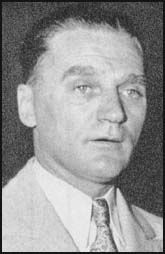
To replace Nye, the President reached across the political aisle and tapped Democrat George C. Marshall to serve as the new Secretary of State. It was a shrewd appointment which enjoyed bipartisan support. During the war, it was Marshall who led the main thrust across France – culminating in the re-capture of Paris – and it was Marshall who led the liberation of Korea from Japanese control. He was an awe-inspiring figure, possessing flawless rectitude and an unwavering coolness under pressure. “General Marshall”, as he preferred to be called, could enter a room and compel instant respect. Astute, honest, and straight-to-the-point, he was the exact type of man Dewey wanted to orderly and efficiently run the State Department. Upon taking the helm, Marshall issued a simple Golden Rule:
“Don’t fight a problem. Solve it.”
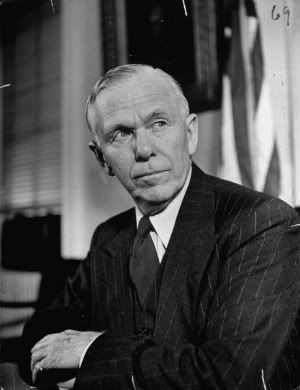
By the summer of 1948, Marshall had been Secretary of State for over half-a-year. July 21st found him sitting at his desk, reviewing paperwork. The previous week had been a busy time politically. In Philadelphia, Pennsylvania, Dewey was re-nominated for a second term at the Republican National Convention. Across the Atlantic, the British held their second General Election since Germany’s surrender four years earlier. Churchill, as leader of the Conservative Party, campaigned for a third term as Prime Minister (having already served in that position for eight years). However, his party had performed poorly in dealing with postwar problems plaguing the United Kingdom. By contrast, the Labor Party argued that they would be better able to lead the nation forward. Conducting an “it’s time for a change” campaign, they won the election in a landslide – sweeping Clement Attlee into power as Prime Minister.
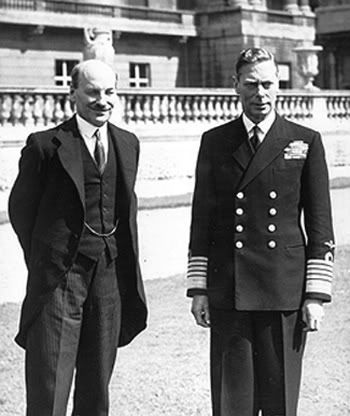
It didn’t take long for the United States to feel the impact of the change of leadership taking place across the Atlantic. It was on July 21st that Marshall was handed an urgent blue paper from the British. According to the document, one of Prime Minister Attlee’s first decisions was to cease providing economic and military support for Greece, Turkey, and Yugoslavia. Defending Southern Europe against Soviet encroachment was straining Britain’s already-weak economy and Attlee had decided to cut-off spending in order to redirect the money into creating a welfare state to provide for the British people “from the cradle to the grave.”
With the United Kingdom pulling out of Southern Europe, the blue paper asked the United States to step in and assume the responsibility of preventing Greece, Turkey, and Yugoslavia from falling into Soviet hands. The Dewey Administration understood that the three nations could only remain Democratic with solid long-term support. Furthermore, the United States already saw containment as the best way to halt the growth of Communism by exerting military, economic, and diplomatic pressures. Upon reading the blue paper, Dewey agreed wholeheartedly with Marshall that the situation was extremely serious. In his words, the United States needed to step up and “do what is required to keep those three nations on our side of the Iron Curtain.”
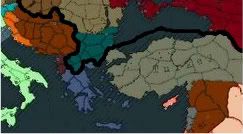
However, taking “immediate action” to prevent Communism from expanding into Southern Europe required obtaining a substantial check from Congress. On July 27th, the President held a crucial meeting with Congressional leaders in the Oval Office. Showing Republican Speaker of the House Joseph William Martin, Jr. of Massachusetts, Democratic House Minority Leader Sam Rayburn of Texas, Republican Senate Majority Leader Wallace White of Maine, Democratic Senate Minority Leader Alben Barkley of Kentucky, and others the blue paper, Dewey sternly warned that the Soviet Union was seeking global domination and that “we are the only country which can stop that from happening.”
The Secretary of State, who also attended the meeting, added that “the choice facing us is to either act with energy or lose by default.”
After listening closely, the Congressional leaders agreed to consider providing economic and military aid to Greece, Turkey, and Yugoslavia. With them on board, the President then presented his case before the rest of Congress. On August 12th, he addressed a joint-session of Congress. In a straightforward speech, Dewey declared that it was the duty of the United States to support Democracy worldwide and oppose Communist aggression everywhere. With the situation urgent, Congress was urged to approve aid as soon as possible. Doing nothing about other countries’ problems was no longer an option:
“In my judgment, we have no choice. It is unthinkable that after a successful war at staggering cost in blood and resources, we should stop now and surrender the fruits of victory.
Southern Europe is now in the desperate position of a man who has gangrene [a disease which causes low blood supply] in the legs. As a doctor, our government must tell the world that we have a very good cure for gangrene. By applying it, the patient can recover and become healthy enough to walk again without worries.
The fact is that these governments have taken their stand on the side of human freedom, which we are struggling to preserve in the face of remorseless, spreading totalitarianism. We chose our side a century-and-a-half ago. Let us help those who seek to stand on our side.”
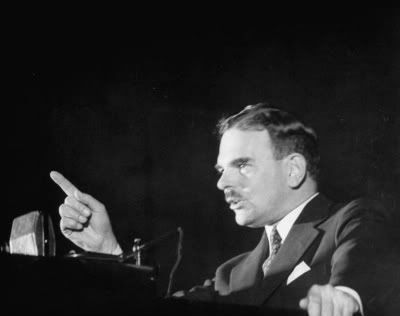
After silently listening to the speech (which would become known as the “Dewey Doctrine”), Congress debated the idea of giving five-hundred million dollars to Greece, Turkey, and Yugoslavia. Public reaction was overwhelmingly supportive of the idea. Following two months of debate, Congress endorsed the Dewey Doctrine by a margin of three-to-one. On October 22nd, Dewey signed the aid package into law. Greece, Turkey, and Yugoslavia would receive vital military and economic aid, greatly reinforcing them against the Communist advance. As for the Dewey Doctrine itself, it would guide America’s foreign policy for the remainder of the Cold War.
I do have a big navy, even though I am conducting yearly 10% cut of my three military branches. In the case of the navy, I am phasing out older models and replacing them with the lastest models.
The Proper Election mod, developed by thevaliant, contains both historical and ahistorical election events for the UK and US. For example, the US has an "Landon Versus Wallace" event in case of an Landon victory in 1936.
Teep: *listens patiently to Teep's opinion*
Here is my response: Speak softly, but carry a big stick. In this case, a big navy. Often times, you can settle matters merely by having a strong show of force.
Thank you for hearing my response.
trekaddict: Well, I think a lot of it had to deal with circumstances. In Europe, the Allies didn't want to risk having a weak Germany in the face of the Soviet Union. With Japan however, I think the Allies wanted to ensure that Japan would not become a military power that someone can take advantage of. In fact, Article 9 is a huge controversy in Japan.
TheVenetian: The Soviet Union has a iron grip over Red China. "Independent nations" don't exist in the Communist sphere.
Le Jones: Yes.
In 2008 in this timeline, Korea is a united nation. The name "Kim Jong-il" means absolutely nothing. The absence of a Communist North Korea gives the United States one less problem to deal with.
BritishImperial: A good point.
The Korean people are definitely much better off in this AAR than they are in real life.
trekaddict: FRG does pump out a lot of infantry divisions in my game.
Faeelin: Not quite.
El Pip: *digs into the file*
The proper UK Elections
Unlike the US elections, which offers lots of choice, this one is fairly easy. In the UK, there are only three elections during the whole 1936 to 1953 period. There had been one in 1935, which the National Conservatives won under Baldwin. I'm going to do the 1945, 1950 and 1951 election. However, do note that the 1945 election will be delayed until Germany is defeated. If Germany never is, Britain will never hold that election and hence the other two will never fire either. Instead, it is possible that other elections (1940 etc) will occur, depending on how the war proceeds. Let's get it underway!
The chain operates as follows:
Very early election (1940 - France beats Germany(!)) - Halifax VS Attlee
Post war election (1943/1944 - If Allies win early) - Attlee VS Churchill
Post war election (1944 - or France beats Germany in 1940) - Attlee VS Churchill
Post war election (1945/1946) - historic - Attlee VS Churchill
The 1948 election if Allies win early/France beats Germany - Attlee VS Churchill
The 1950 election (historic) - Attlee VS Churchill
The 1951 election (historic) - Churchill VS Attlee
The 1952 election (if 1948 election happens) - Anthony Eden VS Herbert Morrison
Personally, I don't see what the problem is. So what if I have different models of warships in my navy? I mean, the United States Navy used Iowa-class battleships during the 1991 Persian Gulf War.
Inner Circle: Yes - although certain circumstances will be different in this AAR.
trekaddict: Here is the link: UK and US Elections Mod
nomonhan: *gives you an "You're amazing!" t-shirt*
I will definitely scope your website out.
I worked a long time to get the new map of Asia to look just right to me.
Rather than mod in ministers (something I am not familiar with), I just went with whatever Paradox gave me.
I agree with your point about Mao. I will alter the Red China information to reflect the new input.
Like Europe, I switched to the Soviet Union and got to work. Otherwise, Red China would be just that: Red.
Yes, good news around Asia.
The 1956 Election between Eisenhower and Stevenson and the 1960 Election between Kennedy and Nixon. That's it. Cut and dry with no regard to whatever happens beforehand (especially if you go ahistorical with the Presidents like I did).
I wouldn't be so sure about that. The Communists can still find a way to get supplies to Ho Chi Minh so he can drive out the French.
--------------------------------------------------------------------------
The Dewey Doctrine
After settling the coal and railroad strikes, Dewey decided to “reorganize” the State Department. He had inherited it from the Vandenberg Administration, so naturally many of her employees had been working there before Dewey took office in January 1945. With the nation at war, the President chose to retain Secretary of State Gerald Nye and his team. However, now that the nation was at peace, he wanted to install his own team to run the State Department. On November 20th, 1947, Nye was summoned to the White House…where he was fired on the spot. Afterwards, photographers caught him looking dazed by the news.

To replace Nye, the President reached across the political aisle and tapped Democrat George C. Marshall to serve as the new Secretary of State. It was a shrewd appointment which enjoyed bipartisan support. During the war, it was Marshall who led the main thrust across France – culminating in the re-capture of Paris – and it was Marshall who led the liberation of Korea from Japanese control. He was an awe-inspiring figure, possessing flawless rectitude and an unwavering coolness under pressure. “General Marshall”, as he preferred to be called, could enter a room and compel instant respect. Astute, honest, and straight-to-the-point, he was the exact type of man Dewey wanted to orderly and efficiently run the State Department. Upon taking the helm, Marshall issued a simple Golden Rule:
“Don’t fight a problem. Solve it.”

By the summer of 1948, Marshall had been Secretary of State for over half-a-year. July 21st found him sitting at his desk, reviewing paperwork. The previous week had been a busy time politically. In Philadelphia, Pennsylvania, Dewey was re-nominated for a second term at the Republican National Convention. Across the Atlantic, the British held their second General Election since Germany’s surrender four years earlier. Churchill, as leader of the Conservative Party, campaigned for a third term as Prime Minister (having already served in that position for eight years). However, his party had performed poorly in dealing with postwar problems plaguing the United Kingdom. By contrast, the Labor Party argued that they would be better able to lead the nation forward. Conducting an “it’s time for a change” campaign, they won the election in a landslide – sweeping Clement Attlee into power as Prime Minister.

It didn’t take long for the United States to feel the impact of the change of leadership taking place across the Atlantic. It was on July 21st that Marshall was handed an urgent blue paper from the British. According to the document, one of Prime Minister Attlee’s first decisions was to cease providing economic and military support for Greece, Turkey, and Yugoslavia. Defending Southern Europe against Soviet encroachment was straining Britain’s already-weak economy and Attlee had decided to cut-off spending in order to redirect the money into creating a welfare state to provide for the British people “from the cradle to the grave.”
With the United Kingdom pulling out of Southern Europe, the blue paper asked the United States to step in and assume the responsibility of preventing Greece, Turkey, and Yugoslavia from falling into Soviet hands. The Dewey Administration understood that the three nations could only remain Democratic with solid long-term support. Furthermore, the United States already saw containment as the best way to halt the growth of Communism by exerting military, economic, and diplomatic pressures. Upon reading the blue paper, Dewey agreed wholeheartedly with Marshall that the situation was extremely serious. In his words, the United States needed to step up and “do what is required to keep those three nations on our side of the Iron Curtain.”

However, taking “immediate action” to prevent Communism from expanding into Southern Europe required obtaining a substantial check from Congress. On July 27th, the President held a crucial meeting with Congressional leaders in the Oval Office. Showing Republican Speaker of the House Joseph William Martin, Jr. of Massachusetts, Democratic House Minority Leader Sam Rayburn of Texas, Republican Senate Majority Leader Wallace White of Maine, Democratic Senate Minority Leader Alben Barkley of Kentucky, and others the blue paper, Dewey sternly warned that the Soviet Union was seeking global domination and that “we are the only country which can stop that from happening.”
The Secretary of State, who also attended the meeting, added that “the choice facing us is to either act with energy or lose by default.”
After listening closely, the Congressional leaders agreed to consider providing economic and military aid to Greece, Turkey, and Yugoslavia. With them on board, the President then presented his case before the rest of Congress. On August 12th, he addressed a joint-session of Congress. In a straightforward speech, Dewey declared that it was the duty of the United States to support Democracy worldwide and oppose Communist aggression everywhere. With the situation urgent, Congress was urged to approve aid as soon as possible. Doing nothing about other countries’ problems was no longer an option:
“In my judgment, we have no choice. It is unthinkable that after a successful war at staggering cost in blood and resources, we should stop now and surrender the fruits of victory.
Southern Europe is now in the desperate position of a man who has gangrene [a disease which causes low blood supply] in the legs. As a doctor, our government must tell the world that we have a very good cure for gangrene. By applying it, the patient can recover and become healthy enough to walk again without worries.
The fact is that these governments have taken their stand on the side of human freedom, which we are struggling to preserve in the face of remorseless, spreading totalitarianism. We chose our side a century-and-a-half ago. Let us help those who seek to stand on our side.”

After silently listening to the speech (which would become known as the “Dewey Doctrine”), Congress debated the idea of giving five-hundred million dollars to Greece, Turkey, and Yugoslavia. Public reaction was overwhelmingly supportive of the idea. Following two months of debate, Congress endorsed the Dewey Doctrine by a margin of three-to-one. On October 22nd, Dewey signed the aid package into law. Greece, Turkey, and Yugoslavia would receive vital military and economic aid, greatly reinforcing them against the Communist advance. As for the Dewey Doctrine itself, it would guide America’s foreign policy for the remainder of the Cold War.
Last edited:
3/31/10: The following update revision is the result of a collaboration with volksmarschall. The Democratic nomination, the fall campaign, and the final results were based on his ideas. I fully credit him for them. 
--------------------------------------------------------------------------
The Election of 1948
By 1948, signs had emerged that prosperity was returning to the United States. Production of consumer goods was growing, incomes were steadily going up, the postwar strikes which had consumed 1947 were finally disappearing, and veterans were flooding college classrooms at an unprecedented rate. In turn, these factors fueled the rebound of Dewey’s approval rating. It was against this backdrop that the President sought a second term. Naturally, he wanted to stay in office for another four years. However, there was also a psychological motive to hit the campaign trail again. In 1944, Dewey had originally been the G.O.P.’s Vice Presidential candidate until the sudden death of incumbent Wendell Willkie propelled the New York Governor into the top spot. Dewey’s “victory” over Democratic candidate Henry A. Wallace was in reality Willkie’s victory (Dewey would be the first to tell you that). The feeling of being an accidental President never escaped Dewey…even as he dealt with monumental challenges ranging from Yalta to preventing Communism from taking over Southern Europe. Now in 1948, the Gangbuster saw his opportunity to exorcise Willkie’s shadow and be elected in his own right.
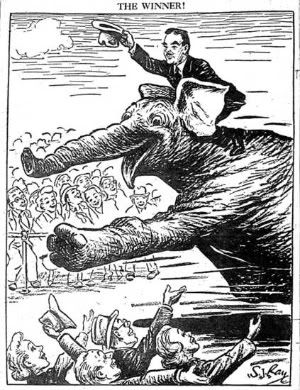
Whenever the incumbent seeks another term in office, it is typically a foregone conclusion that they will be nominated by their respective party’s convention. Of course, it isn’t always a free ride. Sometimes, the President has a big bulls-eye on his back for those who want to unseat them. In 1936 for instance, Franklin D. Roosevelt had to deal with a spirited challenge by Louisiana Senator Huey Long before he was re-nominated by the Democratic Party. Twelve years later, Dewey faced not one but two major opponents on the road to the Republican National Convention in Philadelphia, Pennsylvania: Ohio Senator Robert Taft and former Postmaster General Harold Stassen of Minnesota.
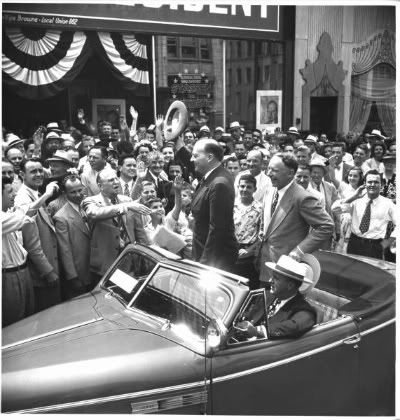
Although both men knew their chances of unseating Dewey were slim at best, they nonetheless took him on in the 1948 primary season. They both centered their campaigns on a theme. Taft’s message was dull: Liberals are bad, Conservatives are good. Stassen, on the other hand, considered himself to be the true heir of Willkie’s legacy and vigorously championed that wherever he went – he would undoubtedly have worn a “W.W.W.D. – What Would Willkie Do?” bracelet if he could have found one. As for Dewey (to use a videogame analogy), he entered the primary season as Donkey Kong, determined to keep Mario (Stassen and Taft) away from Pauline (the Republican nomination).

Starting with the March 8th New Hampshire Republican Primary, the President went on the attack. He painted Taft as a right-wing Conservative out-of-touch with the mainstream. He reminded voters that “the Senator from Ohio still stubbornly clings onto his isolationist beliefs – beliefs that were wrong in 1938 when the Nazi threat was building in Europe, and are still wrong a decade later with Europe and Asia cleaved by an iron curtain. We must stand up to Stalin, not look the other way and vainly pretend he isn’t there. In an age of robot bombs, airplanes that travel with the speed of sound, and atomic weapons, there is no such thing as isolation.”
As for Stassen (whose enthusiastic “I am the next Willkie” campaign energized young people but didn’t sit well with those who would rather forget about the thirty-third President), the driving issue for him was domestic Communism. The former Postmaster General urged the outlawing of the Communist Party of the United States of America. On the campaign trail, Dewey ridiculed the idea, insisting that “you can’t shoot an idea with a gun.”
Having been accused of making “demagogic appeals”, Stassen struck back hard in Oregon by alleging that Dewey was soft on Communism. He criticized the Administration for “moving painfully slow in defending this nation from Communist agents. Only history, I am afraid, will tell how much damage we have suffered as a result of the White House dragging its’ feet instead of actively hunting those who are giving Moscow the upper hand.”
In the final days of the Oregon campaign, Stassen stepped up his rigorous attacks and actually challenged Dewey to a debate. Not one to step down from a fight, the President accepted the challenge. The two men met on May 17th in Portland for the first-ever Presidential debate which was broadcasted nationwide over radio. Rather than have a studio audience, the debate was held in a quiet studio over a single issue: domestic Communism. Stassen went first, repeating his “soft on Communism” charge and demanding immediate approval of the Mundt-Nixon Act – which would have outlawed the CPUSA. “Mr. President,” he asked bluntly, “Why do you oppose such a ban? I want to know. America wants to know. Why do you coddle Communism with legality?”
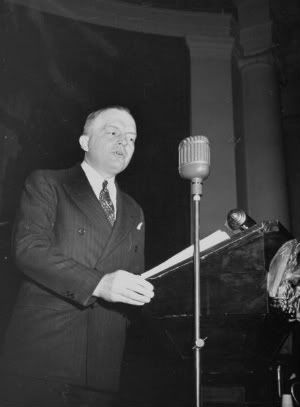
Going second (a coin toss had determined the order), the President defended his handling of domestic Communism:
“There is no question that there are Communists here in our midst. The real question is, ‘What are we going to do about them?’ Some people jeer at the problem, calling it a ‘red herring’. Some people get panicky about it. I don’t belong to either of those groups. We must neither ignore the Communists nor outlaw them. If we ignore them, we give them the cloak of immunity that they want. If we outlaw them, we give them the martyrdom that they want even more.
Mr. Stassen’s suggestion that my Administration is somehow soft on Communism is both false and dangerous. Contrary to his misleading statements, we have been actively pursuing the Communists. We have been kept informed, and we have been keeping the American people informed, of where they are, who they are, and what they are up to.”
He went on to praise the “fine, solid, good American job” that the House Un-American Activities Committee was doing in investigating suspected threats of Communist subversion in Hollywood and elsewhere. He also quoted Republican Representative Karl E. Mundt of South Dakota to portray Stassen as being in “grievous error” in making his sweeping claims about Mundt’s bill. Dewey ended with words that would essentially win him the debate:
“I am unalterably, wholeheartedly, and unswervingly against any scheme to write laws outlawing people because of their religion, political, social, or economic ideas. I am against it because it is a violation of the Constitution of the United States and of the Bill of Rights, and clearly so. I am against it because it is immoral and nothing but totalitarianism itself. I am against it because I know from a great many years experience in the enforcement of the law that the proposal wouldn’t work, and instead it would rapidly advance the cause of Communism in the United States and all over the world.
Stripped to its naked essentials, this is nothing but the method of Hitler and Stalin. It is thought control, borrowed from the Japanese war leadership. It is an attempt to beat down ideas with a club. It is a surrender of everything we believe in.”
Victories in New Hampshire, Oregon, and elsewhere helped enable Dewey to crush his opponents and secure his first-ballot nomination in Philadelphia. All he had to do now was wait and see who the Democrats would throw at him. The answer would come in late June, when the Democratic National Convention convened in Philadelphia’s Municipal Auditorium.
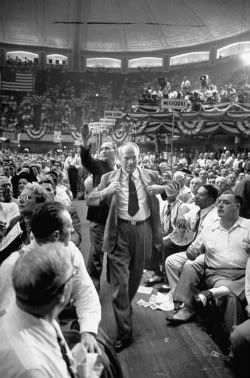
Traditionally, the party out of power goes first when it is time to hold political conventions. For the Democrats, this became the second time since 1944 that they would nominate the opposition candidate. Their last convention had been such a disaster that the Three Stooges (the lineup now consisting of brothers Moe and Shemp Howard and their friend Larry Fine) used it as the basis for a political satire short film. On June 21st, the Democrats opened their thirtieth presidential nominating convention since 1832 – which saw the nomination of President Andrew Jackson of Tennessee for a second term. Television made its’ political debut in Municipal Auditorium, broadcasting the convention proceedings live into living rooms across the country for the first time (something we take for granted today). Whereas the Republicans had an incumbent President to nominate, the Democrats had four major candidates to choose from:
-Forceful former Indiana Governor Paul V. McNutt
-Conservative Senator Richard Russell, Jr. of Georgia
-Successful businessman W. Averell Harriman of New York
-Progressive Senate Minority Leader Alben W. Barkley of Kentucky
Of the four major candidates, Russell was seen as the likely front-runner. Representing Georgia in the Senate since 1933, Russell was a prominent Conservative with a strong faith in what he called the “family farm”.
His record of supporting agricultural programs and rural electrification made him an attractive choice for the Farm vote. It didn’t hurt that he had also chiefly sponsored the 1946 National School Lunch Act, which created a program to provide low-cost or free school lunch meals to qualified students through subsidies to schools. Despite being a highly respected Senator and a skilled legislator, Russell’s candidacy did come with a drawback. Hailing from the Deep South, Russell was a white supremacist who had repeatedly filibustered civil rights legislation. In his eyes, civil rights laws “are unconstitutional and unwise.”
Although Russell never justified using violence to defend segregation, he nonetheless opposed protecting African-Americans from lynching, disenfranchisement, and unequal legal treatment.
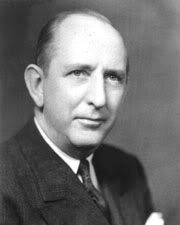
Why was an unapologetic racist the likely front-runner for the Democratic Presidential nomination in 1948? In any other election, Russell’s racist beliefs would have been seen as deplorable – therefore making his candidacy untenable. However, 1948 wasn’t like any other election. The reasons included:
-The G.O.P. was set to nominate a Liberal; therefore, it didn’t make political sense for the Democrats to nominate a “me-too” candidate. Instead, they decided to pick a Conservative like Russell to be the Party’s standard-bearer in order to offer the American people a clear ideological choice about which direction to take the country over the next four years.
-The African-American vote, which had been a column of FDR’s New Deal coalition during the 1930s and early 1940s, had shifted back over to the Republican Party. Naturally favoring whichever Party could bring them results, Blacks were attracted by the efforts of the recent Republican Administrations to advance their cause. With African-Americans certain to be solid in their support for the Party of Lincoln in November, the Democrats generally believed they could write-off that particular bloc and focus intently on the Farm and Labor vote instead. In other words, if Blacks are going to vote for Dewey anyways, why worry about alienating them by nominating a segregationist like Russell?
-The Democrats had nothing to lose. With the White House and Congress firmly in Republican hands, they could afford to nominate a controversial candidate like Russell.
Russell’s front-runner status greatly alarmed Progressive delegates. The idea that the Democratic Party would turn her back on civil rights and embrace racial segregation and states’ rights instead was abhorrent to them. The news that the Party’s platform even lacked a civil rights plank spurred a group of fifty-two outraged Progressive delegates to vehemently fight back. Leading the rebellion was a thirty-seven-year-old Minnesotan named Hubert Humphrey. The Mayor of Minneapolis since July 1945, Humphrey was a hard-working anti-Communist committed to expanding civil rights, education, and Social Security. With his Party retreating from its’ “obligation to make sure that all Americans are treated equally and fairly”, Humphrey and his colleagues decided to publically air their opposition to both the absence of a civil rights plank and Russell in general. Addressing a suddenly-hushed Convention on behalf of the group, Humphrey aggressively argued in favor of adding a “minority plank” which would call for the Federal banning of lynching, ending legalized school segregation, and eliminating discrimination based on skin color. The ten-minutes-long speech would become one of the key moments of 1948 and thrust young Humphrey into the national spotlight:
“My friends, to those who say that we are rushing this issue of civil rights, I say to them we are one-hundred-seventy-two years late. To those who say that this civil-rights program is an infringement on states’ rights, I say this: The time has arrived in America for the Democratic Party to get out of the shadow of states' rights and to walk forthrightly into the bright sunshine of human rights. People -- human beings -- this is the issue of the 20th Century. People of all kinds -- all sorts of people -- and these people are looking to America for leadership, and they’re looking to America for precept and example.
My good friends, my fellow Democrats, I ask you for a calm consideration of our historic opportunity. Let us do forget the evil passions and the blindness of the past. In these times of world economic, political, and spiritual -- above all spiritual crisis, we cannot and we must not turn from the path so plainly before us. That path has already leaded us through many valleys of the shadow of death. And now is the time to recall those who were left on that path of American freedom.
For all of us here, for the millions who have sent us, for the whole two billion members of the human family, our land is now, more than ever before, the last best hope on earth. And I know that we can, and I know that we shall begin here the fuller and richer realization of that hope, that promise of a land where all men are truly free and equal, and each man uses his freedom and equality wisely well.”
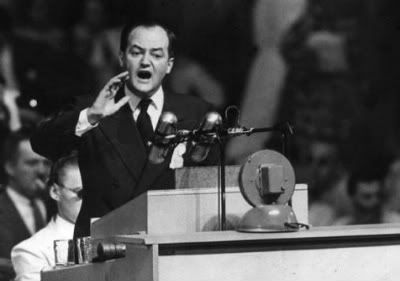
Despite his passionate speech, the minority plank failed to be adopted. Humphrey’s group reacted by walking out of the Convention in protest. Not content with merely exiting Municipal Auditorium, these delegates then formed the Progressive Party two days later. Unanimously nominating Humphrey for President and former California State Senator John Shelley for Vice President, this third party adopted their own platform advocating an end to segregation, granting full voting rights for Blacks, and creating universal government health insurance. They would be the alternative for Democrats who didn't want to vote for either Russell or Dewey.
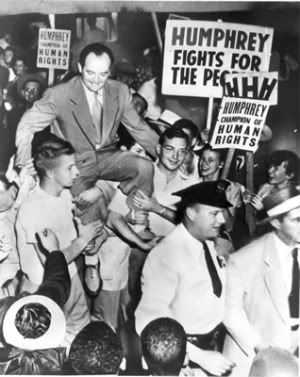
The walk-out by Humphrey and others only delayed the eventuality. On the third ballot, the remaining delegates voted to nominate Russell as the Democratic Presidential candidate. All that remained was the question of who would serve as his running mate. Russell tapped a friend and colleague to fill the number two spot on the ticket: Senate Minority Whip Harry S. Truman of Missouri. Although Truman had no personal ambition to serve as Vice President, the highly-respected Senator had a few things going for him:
-Hailing from the Show-Me State, Truman represented the Midwest – thereby bringing a geographical balance to the ticket.
-A former farmer, Truman had great appeal towards the Farm vote. By having a man who understood and could relate to farmers on the ticket, the Democrats believed they could break the Republican hold over the Farm vote and make solid gains in the Midwest.
-A fiery fighter, Truman could be counted on to vigorously attack the Republicans on the campaign trail – particularly those serving in Congress.
-A Progressive, Truman could moderate the ticket ideologically-wise and hopefully offset Humphrey.
In a private meeting, Russell urged Truman to accept the running mate position. “If nothing else,” he said, “Run for the sake of the Party.”
With this appeal to party loyalty, Truman agreed to accept the offer. Without a roll call vote, the product of the Pendergast political machine was nominated by acclamation. With the Russell-Truman ticket now formed, the Convention concluded with the Georgia Senator’s acceptance speech. In it, the newly-minted standard-bearer of the Democratic Party staunchly defended states’ rights:
“To my mind, a primary test of good government involves an awareness of the importance of maintaining the balance between national and State legislative power intended by the framers of the Constitution.
Various pressure groups are constantly working in behalf of national legislation which violates the intended division of legislative functions between the National and State governments. As we have observed over the last quarter of a century, legislative encroachment by the National Congress is particularly aggressive in times of economic distress. Emergencies of a temporary nature have caused the States to permanently lose many powers that are properly theirs. The lessons of past experiences should be borne in mind today.
I am a disciple of the Jeffersonian school. The more that I study government; the more confirmed I become in the faith that the best and most economical government is that which is locally conceived and locally administered.
As a devout believer in the rights of the States and of local self-government, I have deplored and opposed the constant widening of national power in fields which properly belong to the States and their subdivisions.
The other constitutional doctrine that has become distorted is the doctrine of separation of powers. The Founding Fathers were determined to prevent the corrupting and tyrannous effects of undue concentration of power. They sought to safeguard against one big government. They were familiar with the axiom which history had proved before Lord Acton that ‘all power corrupts and absolute power corrupts absolutely.’”
Three weeks after the DNC, Municipal Auditorium witnessed the July 12th convening of the Republican National Convention. For the G.O.P., this was their twenty-fourth presidential nominating convention since 1856 – which saw the nomination of former California Senator John C. Fremont. They were clearly the party in power, controlling the White House (since 1941), the House of Representatives (since 1945), the Senate (since 1947), and a majority of state governorships. Unlike the Democrats, the Republicans presented television viewers a convention built around party unity. Whereas the Democrats openly feuded, the Republicans operated in unison – ideological differences being pushed aside for the time being.
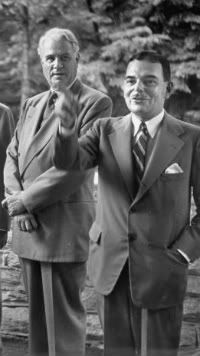
Inside Municipal Auditorium, the spotlight shined brightly on the leader of the United States and his second-in-command (like Willkie before him, Dewey treated his Vice President as an equal):
-President Thomas E. Dewey of New York
-Vice President John Bricker of Ohio
Speaker after speaker praised the two men for their leadership and accomplishments. Dewey’s name was in placed in nomination by Pennsylvania Senator Edward Martin – who was an old friend of his. Martin hailed Dewey as “America’s greatest administrator” and noted “He has been President since that snowy January day in 1945. Through all this time he has grown in the confidence of the nation. Today we have reason to be thankful that he started so young on the national scene, and that he has already led us in a great and thorough manner. He commands today a robust majority, ripened by years of high responsibility – still a young man in the prime of vitality – fit to continue leading a nation that is still young, still expanding, still going places.”
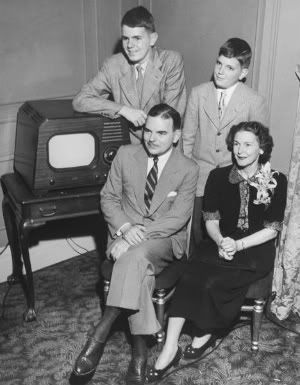
The President and his family watched Martin’s speech on television in their hotel suite. They then watched the balloting, which went off without a hitch. The Dewey-Bricker ticket was nominated on the first ballot to make the case before the nation to be allowed to continue on for another term. A few minutes later, Dewey and his wife were escorted to the Convention, where over thirteen-thousand people sat in anticipation of hearing the President address them. In his twenty-three-minutes-long acceptance speech, a cool and self-assured Dewey spoke of unity while touting his accomplishments and slamming the other parties. The speech set the mood for his upcoming re-election campaign: a battle-harden leader versus an unapologetic racist and an inexperienced idealist:
“The next Presidential term will see the completion of the first half of the Twentieth Century. So far it has been a century of amazing progress and of terrible tragedy. We have seen the world transformed. We have seen mankind's age-long struggle against nature crowned by extraordinary success.
Yet our triumphs have been darkened by bitter defeats in the equally ancient struggle of men to live together in peace, security, and understanding. For this age of progress, this Twentieth Century, has been dominated by two terrible world wars and, between the wars, the worst economic depression in the history of mankind.
The period that is drawing to a close has been one of scientific achievement. The era that is opening before us must be a period of human and spiritual achievement.
We propose, in this Convention, and as a Party, and as a Government, to continue to carry forward the great technological gains of our age. We shall harness the unimaginable possibilities of atomic energy, to bring men and women a larger, fuller life. There is something more important than all this, however. With all the energy, intelligence, and determination which mortal heart and mind can summon to the task, we must maintain a just and lasting peace in the world, and of securing to our own and other like-minded people the blessings of freedom and of individual opportunity.
To me, to be an American in this hour is to dedicate one's life to the freedom of men. As long as the world is half free and half slave, we must peacefully labor to help men everywhere to achieve liberty.
We have declared our goal to be a strong and free America in a free world of free men—free to speak their own minds, free to develop new ideas, free to publish whatever they believe, free to move from place to place, free to choose their occupations, free to enjoy and to save and to use the fruits of their labor, and free to worship God, each according to his own concept of His grace and His mercy.”
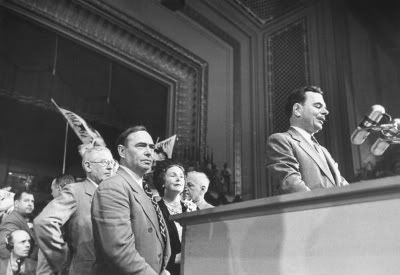
With the conventions over, the three major candidates hit the campaign trail. With the Democrats split in two, the Republicans generally felt they had little to fear. Their optimistic attitude was strengthened by a Newsweek article that predicted “only a miracle or a series of political blunders not to be expected of a man of Dewey’s astuteness can deliver victory to either Russell or Humphrey.”
Reinforcing the belief of an assured victory in November was the presence of Dewey’s Vice President. A popular Conservative from the Midwest, Bricker had great appeal towards those two voting blocs – blocs that Russell would certainly reach for. These were the advantages the President possessed, among others. The general attitude early on in his campaign was “What could possibly derail me?”
The answer came in early August, when the “soft on Communism” charge which Dewey thought he had laid to rest in his radio debate with Stassen came roaring back to life. Unexpectedly, it was neither Russell nor Humphrey who resurrected that demon but a fellow Republican. Unhappy with the slow, methodical approach the Justice Department was taking in rooting out Communists, California Representative Richard Nixon (the "Nixon" in the Mundt-Nixon Act) had taken matters into his own hands by launching an independent investigation. On August 4th, speaking to a roomful of reporters, the young Congressman announced he had uncovered a Communist spy operating freely within the State Department. With evidence provided to him by Whittaker Chambers, a former Communist and now senior editor of Time Magazine, Nixon accused fourteen-years-employee Alger Hiss of spying for Moscow.
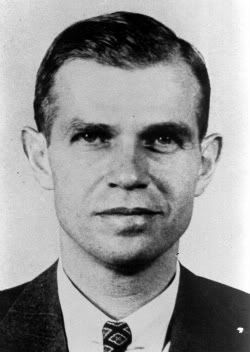
The news rocked the country. Although Hiss denied the accusation, in a politically-charged year, it didn’t really matter. What did matter was the debate it stirred over national security. Nixon’s bombshell greatly undermined the President’s claim that his Administration was on top of the Communist-hunting situation. Having been caught completely off guard, Dewey furiously blamed Nixon for “having put me in a damn spot.”
The “damn spot” to him meant he now faced a lose-lose situation. Why didn’t the Dewey Administration know about Hiss? If they did know about Hiss, why didn’t they get rid of him? These lose-lose questions were ones Russell and Humphrey now exploited. Both men accused the incumbent of being soft on Communism, with Russell being the hardest-hitting:
“We have been assured and reassured that the current Administration has been actively pursuing the Communists. We have been told time and again that they knew ‘where they are, who they are, and what they are up to.’
If that is true, why did it take a Congressman to root out Mr. Hiss? Having had the weakness of their system exposed, the Administration has so-far been counterproductive in their response. Rather than use this opportunity to review their system and make the necessary changes, the Administration has done nothing but attack Congressman Nixon. They have used words like ‘reckless’ and ‘irresponsible’ to describe him.
This, of course, is reckless and irresponsible. Rather than attack the problem, they are attacking the man who exposed the problem. It is not the Congressman’s fault that this Administration has mishandled fighting the most serious internal threat facing our great nation. It is not the Congressman’s fault that the President, the Attorney General, and others are guilty of stumbling in their high duty of preserving, protecting, and defending the United States of America. It is solely the fault of the present Administration."
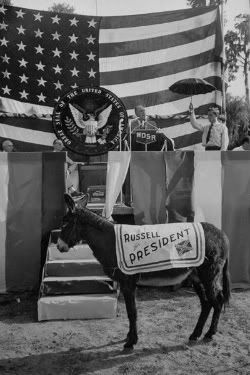
“The present Administration” was forced to sit up and take notice. Russell’s seizure of the domestic Communism issue ate into Dewey’s lead in the polls. Determined to regain the initiative and prevent any more nasty surprises, the President dropped his opposition to widespread loyalty checks. Shortly after Russell made his aforementioned speech, Dewey signed an executive order which established the Federal Employees Loyalty and Security Program. The purpose was to sweep through the Federal Government and root out potentially-harmful employees. Everyone was investigated and had to take a loyalty oath. Those found to have Communist ties or refused to take the oath were fired on the spot. Those who were fired would have absolutely no recourse, even as much as merely finding out who accused them of having Communist sympathies in the first place. This action, a result of political expediency, resulted in three million employees being investigated over a four-year period. Several thousand people lost their jobs – many of them innocent victims of the modern-day witch-hunt that the President had wanted to avoid. He regretted this “example of pure paranoia” and blamed Nixon for it. Dewey never forgave him for throwing him under the bus; nor did Nixon ever apologize for it. To Nixon, it was all worth it. As a result of the Hiss scandal, he earned a national reputation as an ardent anti-Communist so dedicated to protecting the United States that he was willing to courageously stand up and question authority. He became a hero, especially among Conservatives. Telegrams flooded Nixon’s office, largely offering words of support.
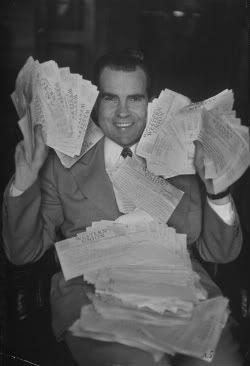
The Alger Hiss episode provided the spark that jumpstarted the fall campaign. Russell and Truman took their case to the country, tearing into the G.O.P. at every stop. Their strategy was straightforward: attack, attack, attack…and attack some more. In particular, Truman’s aggressive and unrelenting partisanship earned him the nickname “Give Them Hell Harry”.
In Truman’s eyes, it wasn’t the President but the Republican majority in Congress which was the root of all evil. It was they who blocked proposals like increasing unemployment compensation and raising the minimum wage – progressive measures that Truman himself had voted for. The Vice Presidential candidate therefore focused his combative speeches on the “do-nothing” record of his Republican Congressional colleagues. Speaking to a crowd in his native Missouri for instance, he forcefully urged them to vote for a Democratic majority in Congress:
“I sincerely hope that all of you will study the issues for what they are worth, and I sincerely hope that on Election Day you won't hesitate to go to the polls, because this Government of ours is made up of the people. Every one of you has a hand in this Government, and when you don't exercise that great privilege which our Forefathers sought to give you, you are shirking your duty, and then if the Government goes wrong, there is nobody to blame but you.
You know, in 1946 two-thirds of you stayed at home and you have got this Republican majority—I say, next to one, the worst majority the country has ever had for the welfare of the public.
If you will study the record, I am sure you will come to the same conclusion that I have, although you are not as close to those things as I am. But your interests are involved in the results of this—the action and no action of the Republicans.
All of you in this good town depend either on some job or on the soil, and if you do your interests have been vitally affected by the actions of this ‘do-nothing’ Republican majority.
Now you are going to have a chance to remedy that on November 2nd. You are going to have a chance to make the Democratic Party, which has always stood for you, the majority party in Congress. Just think of what we can accomplish!”
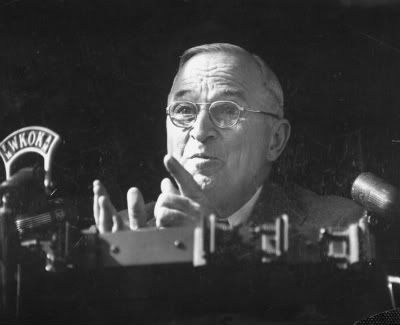
While his running mate was busy advocating a change in Congress, Russell went squarely after the President – starting with the domestic Communism issue of course. Next, he warned of the dangers of Big Government. The Senator argued that the best course the country could pursue would be a return to Conservative values and a smaller Federal Government. This had great appeal towards Conservative Republicans, who were weary of Dewey’s liberal approach to domestic and foreign issues. At the same time, Russell reminded the Labor voters that the Democratic Party stood on their side and pledged to make supporting their cause a chief cornerstone of his Presidency. On the foreign policy front, he was highly critical of Dewey for his handling of Asia. Russell, speaking in an uncompromising tone, slammed the Republican incumbent for allowing Emperor Hirohito to remain on the throne, untouched by the war crime trials that were holding former Prime Minister Hideki Tojo and others accountable for their actions. “The Emperor is just as guilty of waging a cruel and unjustified war against her neighbors as the Generals on the ground and the politicians in Tokyo,” he exclaimed, “To show him leniency means that all those people, including our sons and husbands and fathers, who fought against Japanese tyranny and died in the process did so in vain. That is inexcusable!”
He also had sharp words for America’s relationship with Korea and Nationalist China. Russell found it “disturbing” that the President had closely allied America with nations “whose ‘Democratic’ governments are at best questionable.”
He pointed out that Korean President Syngman Rhee was running his country like a dictator, squashing the opposition through the brutal use of force. Russell expressed his disbelief that “the United States, after sacrificing so much to liberate the Korean people, can look the other way as the Rhee government kills thousands of its’ own citizens.”
Then there was Nationalist China:
“In Chiang Kai-shek, we have another iron-fisted ruler. He is thoroughly corrupt; indeed, he is not fit to lead his people. Yet, as with the Korean government, this Administration shuns that aside and treats Kai-shek like he is the best man for the job. The Chinese people, who are suffering from high inflation and limited freedom, deserve better. They deserve the right to cast aside this rot and elect their own leaders. They do not deserve to be told that they have to accept the government this Administration imposed upon them and that they have no other choice on the matter.”
A prominent supporter of a strong national defense, Russell vowed to step up the containment policy against the Soviet Union. He would supplement financial support by increasing America’s military presence in Europe and Asia. He would also strengthen the United States military overall and increase defense spending to prepare the nation for the frightening prospect of the Cold War turning hot. In other words, Russell was a peace-through-strength candidate.
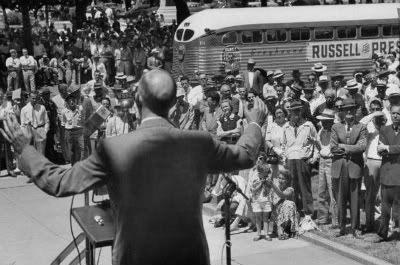
Over on the Republican side, the President knew that in order to win re-election, he needed every vote he could get. He had to not only defend his record but counterattack as well. The primary form of transportation for him would be the Ferdinand Magellan, the official private Pullman railroad car of the President of the United States. Eighty-three-feet-long, the comfortable, heavily-armored railroad car had been transporting the Head of State since 1942. All across the country, Dewey reminded audiences of what had been achieved so far and warned against “changing horses in midstream.”
Among the achievements he touted:
-Establishing post-war peace through Yalta, Potsdam, and the United Nations.
-The joint-construction of the Saint Lawrence Seaway with Canada.
-Reforming the Federal tax system.
-Intervening decisively in last year’s coal and railroad strikes.
-His recent decision to prop up Southern Europe against Communist expansion.
He also targeted two specific voting blocs. To keep Humphrey away from the important African-American vote, Dewey told Blacks that the Republican Party was the best friend they ever had and would continue to be so. He boasted of his firm record on civil rights and went after “those obstructionist Democrats who would lynch you in a heartbeat.”
Engaging in fear-mongering, Dewey painted a nightmare scenario of a President Russell rolling back hard-won civil rights progress and employing the overly-racist Ku Klux Klan to enforce his will. “In your hands,” he warned, “Lays the power to decide whether the next Presidential term will witness great progress or terrible tragedy.”
The other important voting bloc was the Farm vote. Although the Midwest had been solidly in G.O.P. hands since 1940, it couldn’t be taken for granted in 1948 since the Democratic, Republican, and Progressive Parties were all targeting the region. If Dewey could hold onto the American heartland, it would give him 155 electoral votes (leaving him to find at least 111 more in order to win). That made the Farm vote essential. Touring the vital region (sometimes alongside his regional coordinator there, Republican Representative Everett Dirksen of Illinois), the President's strategy was to reinforce farmers’ traditional Republican loyalty. He proudly reminded them that his Administration was the anti-Coolidge when it came to addressing their issues and meeting their needs. Whereas Silent Cal had spent his Presidency opposing government support for farmers, Dewey had done the exact opposite. Under his watch, Federal farm aide – “so essential for the confidence of the farmer” – had been expanded. In early 1948, he had signed the Hope-Aiken Act into law, which strengthened the farm price support program by making it more flexible. Furthermore, one of the things Dewey planned to do in his second term was to increase Federal soil conservation funding. Time and again in his Midwestern speeches, he emphasized his pro-Farm policies.
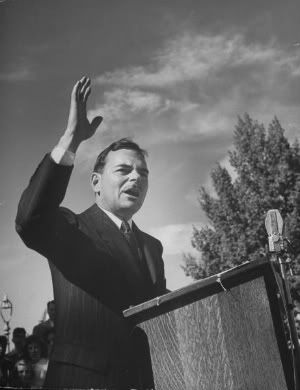
In addition to the President conducting a vigorous campaign, the Vice President also worked hard to ensure victory in November. Although they had their ideological differences, the two men respected each other. Dewey treated his Vice President as an equal and made him his middle man in dealing with state governors. In turn, Bricker used his considerable charm to win support for the Administration. On the campaign trail, the Ohioan’s primary tasks were to mollify his fellow Conservatives – who were being tempted by Russell – and keep his native Midwest region in line. Bricker’s lackluster speeches were probably the most unexceptional of the entire campaign.
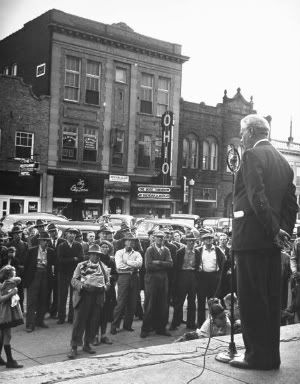
Time and again throughout American history, elections are decided – in part – by the state of the economy. A strong economy can help ensure victory (just ask Republican incumbent William McKinley in 1900); by vice-versa, a weak economy can doom a candidate to defeat (just ask Democratic incumbent Martin Van Buren in 1840). The economy in 1948 was booming, and the President made sure everyone knew that. Throughout the campaign, Dewey pointed out that under his leadership, profits were up, farmers were prospering, tax reform/cuts meant that people had more money in their pockets, the networking capital of corporations were approaching a new high (nearly sixty-four billion dollars), strikes were in decline, unemployment was nearing four percent, inflation was being contained, and production of consumer goods was at an all-time high. Dewey proudly declared that his fiscal responsibility was at the heart of the boom. He also restated his support for the surviving New Deal programs that were still going strong despite Conservative resentment:
“Such programs, like Social Security and unemployment insurance, cost little when compared with the gain in human happiness.”
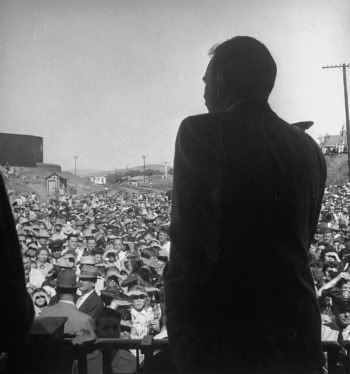
Of course, there were also Humphrey and Shelley. Crusading across the country, the Progressives drew large crowds of ardent young liberals, blue-collar workers, women, and African-Americans. Calling the nomination of Russell “a brutal stab in the back”, Humphrey urged his fellow Democrats to stand up for civil rights and vote Progressive. As for the Republicans, the Mayor of Minneapolis criticized the President for not doing enough to help Labor and promised to strengthen Union rights if elected. In response, Russell warned that if the Progressives won, “they will destroy state rights and unconstitutionally expand the Federal Government into areas where it doesn’t belong. They will dismantle the balance of power between Washington and the forty-eight state capitals and will push the forty-eight individual stars on our flag into a one-star dictatorship.”
As Election Day neared, polls taken by George Gallup and others showed the race tightening. Although the President remained in front throughout the campaign, his lead was shrinking…partly as a result of Humphrey gaining momentum among like-minded voters. This greatly worried the Republicans. Russell by himself might not be able to win, but with the Progressive Party surging in strength, the White House was consumed by worse-case scenarios. If the third party took enough votes away, either the Democrats could squeak through a victory (266 electoral votes being the minimum amount needed) or the election could deadlock and get constitutionally thrown into the House of Representatives – where anything could happen. To combat the threat Humphrey posed, the President hammered away at him; mainly arguing that his lack of experience made his candidacy too risky to take a chance on. Curiously, against the advice of others, he didn’t make Humphrey’s age an issue (perhaps Dewey’s status as America’s youngest-elected President had something to do with it).
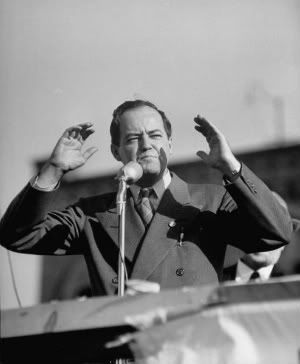
The three-way fight between Dewey, Russell, and Humphrey rolled through September and October. Finally, on November 2nd, the nation rendered her decision. Forty-nine million Americans went to the polls, including the three major candidates. Afterwards, Russell and Humphrey made their way to their homes in Georgia and Minnesota (respectively) and Dewey returned to the [Theodore] Roosevelt Hotel in New York City (the scene of his victory four years earlier) to await the election returns. Like every other American, the three men had a new way to follow the results as they came in from across the country. That night, the major news networks televised the returns for the first time (another 1948 debut that we take for granted today).
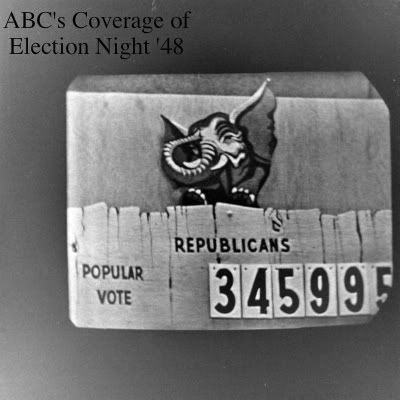
According to the final Gallup Poll, the President was a few points ahead of Russell with Humphrey not too far behind. The pollsters and experts generally predicted a close win for the Republican incumbent – a far cry from the assured victory declared in the aftermath of the summer conventions. The split within the Democratic Party turned out to be misleading. Rather than weaken the opposition, it gave Dewey two strong candidates to deal with. He couldn’t take victory for granted; instead, he had to work hard for it. Now, on Election Night, the President sat on his bed inside Suite 1527 (his exclusive hotel suite whenever he stayed in New York City), performing number-crunching with his yellow legal pad. The early returns coming out of the Northeast indicated the true scope of Humphrey’s strength. Democrats who couldn’t get past Russell’s blatant racism openly embraced the Progressive Party instead; the third party took Massachusetts and Rhode Island, along with second-place finishes in several states. Down South, the region lived up to its’ “solid” reputation. The Georgia Senator carried every Southern state except Delaware and Maryland (which both remained Republican – in the case of Delaware, the last time she went Democratic was 1912). For Dewey, the moment of truth came when results from the Midwest started to roll in. The future of his Presidency hinged on what happened in the American heartland. All three major parties had campaigned hard in this region, and the votes reflected that. To Republican relief, the Farm and African-American vote largely stuck with them; this greatly helped them keep most of the Midwest in their column, losing only three states. Russell captured Truman’s home state of Missouri while Humphrey won Wisconsin and his home state of Minnesota. Out West, the results were also mixed. Montana and Washington went Progressive, the Democrats took home three states, and the Republicans carried the rest (including the crucial state of California). After all was said and done, Dewey won re-election with 293 electoral votes – 183 going to Russell and 55 going to Humphrey. In the popular vote count, twenty-five million voters sent the President back to the White House for another four years. Russell, on the other hand, received seventeen million votes. Six million voters cast their ballots for Humphrey, giving the young man a respectable showing. Had the Democratic Party been unified, the outcome might have been closer. Russell ran a strong campaign, but the revolt by liberal Democrats greatly damaged him.

Dewey/Bricker (Republican/Red) – 293 Electoral Votes – 24 States Carried – 24,918,858 Popular Votes – 51.07% of Total Votes
Russell/Truman (Democratic/Blue) – 183 Electoral Votes – 18 States Carried – 17,473,053 Popular Votes – 35.80% of Total Votes
Humphrey/Shelley (Progressive/Green) – 55 Electoral Votes – 6 States Carried – 6,111,986 Popular Votes – 12.53% of Total Votes
--------------------------------------------------------------------------
The Election of 1948
By 1948, signs had emerged that prosperity was returning to the United States. Production of consumer goods was growing, incomes were steadily going up, the postwar strikes which had consumed 1947 were finally disappearing, and veterans were flooding college classrooms at an unprecedented rate. In turn, these factors fueled the rebound of Dewey’s approval rating. It was against this backdrop that the President sought a second term. Naturally, he wanted to stay in office for another four years. However, there was also a psychological motive to hit the campaign trail again. In 1944, Dewey had originally been the G.O.P.’s Vice Presidential candidate until the sudden death of incumbent Wendell Willkie propelled the New York Governor into the top spot. Dewey’s “victory” over Democratic candidate Henry A. Wallace was in reality Willkie’s victory (Dewey would be the first to tell you that). The feeling of being an accidental President never escaped Dewey…even as he dealt with monumental challenges ranging from Yalta to preventing Communism from taking over Southern Europe. Now in 1948, the Gangbuster saw his opportunity to exorcise Willkie’s shadow and be elected in his own right.

Whenever the incumbent seeks another term in office, it is typically a foregone conclusion that they will be nominated by their respective party’s convention. Of course, it isn’t always a free ride. Sometimes, the President has a big bulls-eye on his back for those who want to unseat them. In 1936 for instance, Franklin D. Roosevelt had to deal with a spirited challenge by Louisiana Senator Huey Long before he was re-nominated by the Democratic Party. Twelve years later, Dewey faced not one but two major opponents on the road to the Republican National Convention in Philadelphia, Pennsylvania: Ohio Senator Robert Taft and former Postmaster General Harold Stassen of Minnesota.

Although both men knew their chances of unseating Dewey were slim at best, they nonetheless took him on in the 1948 primary season. They both centered their campaigns on a theme. Taft’s message was dull: Liberals are bad, Conservatives are good. Stassen, on the other hand, considered himself to be the true heir of Willkie’s legacy and vigorously championed that wherever he went – he would undoubtedly have worn a “W.W.W.D. – What Would Willkie Do?” bracelet if he could have found one. As for Dewey (to use a videogame analogy), he entered the primary season as Donkey Kong, determined to keep Mario (Stassen and Taft) away from Pauline (the Republican nomination).

Starting with the March 8th New Hampshire Republican Primary, the President went on the attack. He painted Taft as a right-wing Conservative out-of-touch with the mainstream. He reminded voters that “the Senator from Ohio still stubbornly clings onto his isolationist beliefs – beliefs that were wrong in 1938 when the Nazi threat was building in Europe, and are still wrong a decade later with Europe and Asia cleaved by an iron curtain. We must stand up to Stalin, not look the other way and vainly pretend he isn’t there. In an age of robot bombs, airplanes that travel with the speed of sound, and atomic weapons, there is no such thing as isolation.”
As for Stassen (whose enthusiastic “I am the next Willkie” campaign energized young people but didn’t sit well with those who would rather forget about the thirty-third President), the driving issue for him was domestic Communism. The former Postmaster General urged the outlawing of the Communist Party of the United States of America. On the campaign trail, Dewey ridiculed the idea, insisting that “you can’t shoot an idea with a gun.”
Having been accused of making “demagogic appeals”, Stassen struck back hard in Oregon by alleging that Dewey was soft on Communism. He criticized the Administration for “moving painfully slow in defending this nation from Communist agents. Only history, I am afraid, will tell how much damage we have suffered as a result of the White House dragging its’ feet instead of actively hunting those who are giving Moscow the upper hand.”
In the final days of the Oregon campaign, Stassen stepped up his rigorous attacks and actually challenged Dewey to a debate. Not one to step down from a fight, the President accepted the challenge. The two men met on May 17th in Portland for the first-ever Presidential debate which was broadcasted nationwide over radio. Rather than have a studio audience, the debate was held in a quiet studio over a single issue: domestic Communism. Stassen went first, repeating his “soft on Communism” charge and demanding immediate approval of the Mundt-Nixon Act – which would have outlawed the CPUSA. “Mr. President,” he asked bluntly, “Why do you oppose such a ban? I want to know. America wants to know. Why do you coddle Communism with legality?”

Going second (a coin toss had determined the order), the President defended his handling of domestic Communism:
“There is no question that there are Communists here in our midst. The real question is, ‘What are we going to do about them?’ Some people jeer at the problem, calling it a ‘red herring’. Some people get panicky about it. I don’t belong to either of those groups. We must neither ignore the Communists nor outlaw them. If we ignore them, we give them the cloak of immunity that they want. If we outlaw them, we give them the martyrdom that they want even more.
Mr. Stassen’s suggestion that my Administration is somehow soft on Communism is both false and dangerous. Contrary to his misleading statements, we have been actively pursuing the Communists. We have been kept informed, and we have been keeping the American people informed, of where they are, who they are, and what they are up to.”
He went on to praise the “fine, solid, good American job” that the House Un-American Activities Committee was doing in investigating suspected threats of Communist subversion in Hollywood and elsewhere. He also quoted Republican Representative Karl E. Mundt of South Dakota to portray Stassen as being in “grievous error” in making his sweeping claims about Mundt’s bill. Dewey ended with words that would essentially win him the debate:
“I am unalterably, wholeheartedly, and unswervingly against any scheme to write laws outlawing people because of their religion, political, social, or economic ideas. I am against it because it is a violation of the Constitution of the United States and of the Bill of Rights, and clearly so. I am against it because it is immoral and nothing but totalitarianism itself. I am against it because I know from a great many years experience in the enforcement of the law that the proposal wouldn’t work, and instead it would rapidly advance the cause of Communism in the United States and all over the world.
Stripped to its naked essentials, this is nothing but the method of Hitler and Stalin. It is thought control, borrowed from the Japanese war leadership. It is an attempt to beat down ideas with a club. It is a surrender of everything we believe in.”
Victories in New Hampshire, Oregon, and elsewhere helped enable Dewey to crush his opponents and secure his first-ballot nomination in Philadelphia. All he had to do now was wait and see who the Democrats would throw at him. The answer would come in late June, when the Democratic National Convention convened in Philadelphia’s Municipal Auditorium.

Traditionally, the party out of power goes first when it is time to hold political conventions. For the Democrats, this became the second time since 1944 that they would nominate the opposition candidate. Their last convention had been such a disaster that the Three Stooges (the lineup now consisting of brothers Moe and Shemp Howard and their friend Larry Fine) used it as the basis for a political satire short film. On June 21st, the Democrats opened their thirtieth presidential nominating convention since 1832 – which saw the nomination of President Andrew Jackson of Tennessee for a second term. Television made its’ political debut in Municipal Auditorium, broadcasting the convention proceedings live into living rooms across the country for the first time (something we take for granted today). Whereas the Republicans had an incumbent President to nominate, the Democrats had four major candidates to choose from:
-Forceful former Indiana Governor Paul V. McNutt
-Conservative Senator Richard Russell, Jr. of Georgia
-Successful businessman W. Averell Harriman of New York
-Progressive Senate Minority Leader Alben W. Barkley of Kentucky
Of the four major candidates, Russell was seen as the likely front-runner. Representing Georgia in the Senate since 1933, Russell was a prominent Conservative with a strong faith in what he called the “family farm”.
His record of supporting agricultural programs and rural electrification made him an attractive choice for the Farm vote. It didn’t hurt that he had also chiefly sponsored the 1946 National School Lunch Act, which created a program to provide low-cost or free school lunch meals to qualified students through subsidies to schools. Despite being a highly respected Senator and a skilled legislator, Russell’s candidacy did come with a drawback. Hailing from the Deep South, Russell was a white supremacist who had repeatedly filibustered civil rights legislation. In his eyes, civil rights laws “are unconstitutional and unwise.”
Although Russell never justified using violence to defend segregation, he nonetheless opposed protecting African-Americans from lynching, disenfranchisement, and unequal legal treatment.

Why was an unapologetic racist the likely front-runner for the Democratic Presidential nomination in 1948? In any other election, Russell’s racist beliefs would have been seen as deplorable – therefore making his candidacy untenable. However, 1948 wasn’t like any other election. The reasons included:
-The G.O.P. was set to nominate a Liberal; therefore, it didn’t make political sense for the Democrats to nominate a “me-too” candidate. Instead, they decided to pick a Conservative like Russell to be the Party’s standard-bearer in order to offer the American people a clear ideological choice about which direction to take the country over the next four years.
-The African-American vote, which had been a column of FDR’s New Deal coalition during the 1930s and early 1940s, had shifted back over to the Republican Party. Naturally favoring whichever Party could bring them results, Blacks were attracted by the efforts of the recent Republican Administrations to advance their cause. With African-Americans certain to be solid in their support for the Party of Lincoln in November, the Democrats generally believed they could write-off that particular bloc and focus intently on the Farm and Labor vote instead. In other words, if Blacks are going to vote for Dewey anyways, why worry about alienating them by nominating a segregationist like Russell?
-The Democrats had nothing to lose. With the White House and Congress firmly in Republican hands, they could afford to nominate a controversial candidate like Russell.
Russell’s front-runner status greatly alarmed Progressive delegates. The idea that the Democratic Party would turn her back on civil rights and embrace racial segregation and states’ rights instead was abhorrent to them. The news that the Party’s platform even lacked a civil rights plank spurred a group of fifty-two outraged Progressive delegates to vehemently fight back. Leading the rebellion was a thirty-seven-year-old Minnesotan named Hubert Humphrey. The Mayor of Minneapolis since July 1945, Humphrey was a hard-working anti-Communist committed to expanding civil rights, education, and Social Security. With his Party retreating from its’ “obligation to make sure that all Americans are treated equally and fairly”, Humphrey and his colleagues decided to publically air their opposition to both the absence of a civil rights plank and Russell in general. Addressing a suddenly-hushed Convention on behalf of the group, Humphrey aggressively argued in favor of adding a “minority plank” which would call for the Federal banning of lynching, ending legalized school segregation, and eliminating discrimination based on skin color. The ten-minutes-long speech would become one of the key moments of 1948 and thrust young Humphrey into the national spotlight:
“My friends, to those who say that we are rushing this issue of civil rights, I say to them we are one-hundred-seventy-two years late. To those who say that this civil-rights program is an infringement on states’ rights, I say this: The time has arrived in America for the Democratic Party to get out of the shadow of states' rights and to walk forthrightly into the bright sunshine of human rights. People -- human beings -- this is the issue of the 20th Century. People of all kinds -- all sorts of people -- and these people are looking to America for leadership, and they’re looking to America for precept and example.
My good friends, my fellow Democrats, I ask you for a calm consideration of our historic opportunity. Let us do forget the evil passions and the blindness of the past. In these times of world economic, political, and spiritual -- above all spiritual crisis, we cannot and we must not turn from the path so plainly before us. That path has already leaded us through many valleys of the shadow of death. And now is the time to recall those who were left on that path of American freedom.
For all of us here, for the millions who have sent us, for the whole two billion members of the human family, our land is now, more than ever before, the last best hope on earth. And I know that we can, and I know that we shall begin here the fuller and richer realization of that hope, that promise of a land where all men are truly free and equal, and each man uses his freedom and equality wisely well.”

Despite his passionate speech, the minority plank failed to be adopted. Humphrey’s group reacted by walking out of the Convention in protest. Not content with merely exiting Municipal Auditorium, these delegates then formed the Progressive Party two days later. Unanimously nominating Humphrey for President and former California State Senator John Shelley for Vice President, this third party adopted their own platform advocating an end to segregation, granting full voting rights for Blacks, and creating universal government health insurance. They would be the alternative for Democrats who didn't want to vote for either Russell or Dewey.

The walk-out by Humphrey and others only delayed the eventuality. On the third ballot, the remaining delegates voted to nominate Russell as the Democratic Presidential candidate. All that remained was the question of who would serve as his running mate. Russell tapped a friend and colleague to fill the number two spot on the ticket: Senate Minority Whip Harry S. Truman of Missouri. Although Truman had no personal ambition to serve as Vice President, the highly-respected Senator had a few things going for him:
-Hailing from the Show-Me State, Truman represented the Midwest – thereby bringing a geographical balance to the ticket.
-A former farmer, Truman had great appeal towards the Farm vote. By having a man who understood and could relate to farmers on the ticket, the Democrats believed they could break the Republican hold over the Farm vote and make solid gains in the Midwest.
-A fiery fighter, Truman could be counted on to vigorously attack the Republicans on the campaign trail – particularly those serving in Congress.
-A Progressive, Truman could moderate the ticket ideologically-wise and hopefully offset Humphrey.
In a private meeting, Russell urged Truman to accept the running mate position. “If nothing else,” he said, “Run for the sake of the Party.”
With this appeal to party loyalty, Truman agreed to accept the offer. Without a roll call vote, the product of the Pendergast political machine was nominated by acclamation. With the Russell-Truman ticket now formed, the Convention concluded with the Georgia Senator’s acceptance speech. In it, the newly-minted standard-bearer of the Democratic Party staunchly defended states’ rights:
“To my mind, a primary test of good government involves an awareness of the importance of maintaining the balance between national and State legislative power intended by the framers of the Constitution.
Various pressure groups are constantly working in behalf of national legislation which violates the intended division of legislative functions between the National and State governments. As we have observed over the last quarter of a century, legislative encroachment by the National Congress is particularly aggressive in times of economic distress. Emergencies of a temporary nature have caused the States to permanently lose many powers that are properly theirs. The lessons of past experiences should be borne in mind today.
I am a disciple of the Jeffersonian school. The more that I study government; the more confirmed I become in the faith that the best and most economical government is that which is locally conceived and locally administered.
As a devout believer in the rights of the States and of local self-government, I have deplored and opposed the constant widening of national power in fields which properly belong to the States and their subdivisions.
The other constitutional doctrine that has become distorted is the doctrine of separation of powers. The Founding Fathers were determined to prevent the corrupting and tyrannous effects of undue concentration of power. They sought to safeguard against one big government. They were familiar with the axiom which history had proved before Lord Acton that ‘all power corrupts and absolute power corrupts absolutely.’”
Three weeks after the DNC, Municipal Auditorium witnessed the July 12th convening of the Republican National Convention. For the G.O.P., this was their twenty-fourth presidential nominating convention since 1856 – which saw the nomination of former California Senator John C. Fremont. They were clearly the party in power, controlling the White House (since 1941), the House of Representatives (since 1945), the Senate (since 1947), and a majority of state governorships. Unlike the Democrats, the Republicans presented television viewers a convention built around party unity. Whereas the Democrats openly feuded, the Republicans operated in unison – ideological differences being pushed aside for the time being.

Inside Municipal Auditorium, the spotlight shined brightly on the leader of the United States and his second-in-command (like Willkie before him, Dewey treated his Vice President as an equal):
-President Thomas E. Dewey of New York
-Vice President John Bricker of Ohio
Speaker after speaker praised the two men for their leadership and accomplishments. Dewey’s name was in placed in nomination by Pennsylvania Senator Edward Martin – who was an old friend of his. Martin hailed Dewey as “America’s greatest administrator” and noted “He has been President since that snowy January day in 1945. Through all this time he has grown in the confidence of the nation. Today we have reason to be thankful that he started so young on the national scene, and that he has already led us in a great and thorough manner. He commands today a robust majority, ripened by years of high responsibility – still a young man in the prime of vitality – fit to continue leading a nation that is still young, still expanding, still going places.”

The President and his family watched Martin’s speech on television in their hotel suite. They then watched the balloting, which went off without a hitch. The Dewey-Bricker ticket was nominated on the first ballot to make the case before the nation to be allowed to continue on for another term. A few minutes later, Dewey and his wife were escorted to the Convention, where over thirteen-thousand people sat in anticipation of hearing the President address them. In his twenty-three-minutes-long acceptance speech, a cool and self-assured Dewey spoke of unity while touting his accomplishments and slamming the other parties. The speech set the mood for his upcoming re-election campaign: a battle-harden leader versus an unapologetic racist and an inexperienced idealist:
“The next Presidential term will see the completion of the first half of the Twentieth Century. So far it has been a century of amazing progress and of terrible tragedy. We have seen the world transformed. We have seen mankind's age-long struggle against nature crowned by extraordinary success.
Yet our triumphs have been darkened by bitter defeats in the equally ancient struggle of men to live together in peace, security, and understanding. For this age of progress, this Twentieth Century, has been dominated by two terrible world wars and, between the wars, the worst economic depression in the history of mankind.
The period that is drawing to a close has been one of scientific achievement. The era that is opening before us must be a period of human and spiritual achievement.
We propose, in this Convention, and as a Party, and as a Government, to continue to carry forward the great technological gains of our age. We shall harness the unimaginable possibilities of atomic energy, to bring men and women a larger, fuller life. There is something more important than all this, however. With all the energy, intelligence, and determination which mortal heart and mind can summon to the task, we must maintain a just and lasting peace in the world, and of securing to our own and other like-minded people the blessings of freedom and of individual opportunity.
To me, to be an American in this hour is to dedicate one's life to the freedom of men. As long as the world is half free and half slave, we must peacefully labor to help men everywhere to achieve liberty.
We have declared our goal to be a strong and free America in a free world of free men—free to speak their own minds, free to develop new ideas, free to publish whatever they believe, free to move from place to place, free to choose their occupations, free to enjoy and to save and to use the fruits of their labor, and free to worship God, each according to his own concept of His grace and His mercy.”

With the conventions over, the three major candidates hit the campaign trail. With the Democrats split in two, the Republicans generally felt they had little to fear. Their optimistic attitude was strengthened by a Newsweek article that predicted “only a miracle or a series of political blunders not to be expected of a man of Dewey’s astuteness can deliver victory to either Russell or Humphrey.”
Reinforcing the belief of an assured victory in November was the presence of Dewey’s Vice President. A popular Conservative from the Midwest, Bricker had great appeal towards those two voting blocs – blocs that Russell would certainly reach for. These were the advantages the President possessed, among others. The general attitude early on in his campaign was “What could possibly derail me?”
The answer came in early August, when the “soft on Communism” charge which Dewey thought he had laid to rest in his radio debate with Stassen came roaring back to life. Unexpectedly, it was neither Russell nor Humphrey who resurrected that demon but a fellow Republican. Unhappy with the slow, methodical approach the Justice Department was taking in rooting out Communists, California Representative Richard Nixon (the "Nixon" in the Mundt-Nixon Act) had taken matters into his own hands by launching an independent investigation. On August 4th, speaking to a roomful of reporters, the young Congressman announced he had uncovered a Communist spy operating freely within the State Department. With evidence provided to him by Whittaker Chambers, a former Communist and now senior editor of Time Magazine, Nixon accused fourteen-years-employee Alger Hiss of spying for Moscow.

The news rocked the country. Although Hiss denied the accusation, in a politically-charged year, it didn’t really matter. What did matter was the debate it stirred over national security. Nixon’s bombshell greatly undermined the President’s claim that his Administration was on top of the Communist-hunting situation. Having been caught completely off guard, Dewey furiously blamed Nixon for “having put me in a damn spot.”
The “damn spot” to him meant he now faced a lose-lose situation. Why didn’t the Dewey Administration know about Hiss? If they did know about Hiss, why didn’t they get rid of him? These lose-lose questions were ones Russell and Humphrey now exploited. Both men accused the incumbent of being soft on Communism, with Russell being the hardest-hitting:
“We have been assured and reassured that the current Administration has been actively pursuing the Communists. We have been told time and again that they knew ‘where they are, who they are, and what they are up to.’
If that is true, why did it take a Congressman to root out Mr. Hiss? Having had the weakness of their system exposed, the Administration has so-far been counterproductive in their response. Rather than use this opportunity to review their system and make the necessary changes, the Administration has done nothing but attack Congressman Nixon. They have used words like ‘reckless’ and ‘irresponsible’ to describe him.
This, of course, is reckless and irresponsible. Rather than attack the problem, they are attacking the man who exposed the problem. It is not the Congressman’s fault that this Administration has mishandled fighting the most serious internal threat facing our great nation. It is not the Congressman’s fault that the President, the Attorney General, and others are guilty of stumbling in their high duty of preserving, protecting, and defending the United States of America. It is solely the fault of the present Administration."

“The present Administration” was forced to sit up and take notice. Russell’s seizure of the domestic Communism issue ate into Dewey’s lead in the polls. Determined to regain the initiative and prevent any more nasty surprises, the President dropped his opposition to widespread loyalty checks. Shortly after Russell made his aforementioned speech, Dewey signed an executive order which established the Federal Employees Loyalty and Security Program. The purpose was to sweep through the Federal Government and root out potentially-harmful employees. Everyone was investigated and had to take a loyalty oath. Those found to have Communist ties or refused to take the oath were fired on the spot. Those who were fired would have absolutely no recourse, even as much as merely finding out who accused them of having Communist sympathies in the first place. This action, a result of political expediency, resulted in three million employees being investigated over a four-year period. Several thousand people lost their jobs – many of them innocent victims of the modern-day witch-hunt that the President had wanted to avoid. He regretted this “example of pure paranoia” and blamed Nixon for it. Dewey never forgave him for throwing him under the bus; nor did Nixon ever apologize for it. To Nixon, it was all worth it. As a result of the Hiss scandal, he earned a national reputation as an ardent anti-Communist so dedicated to protecting the United States that he was willing to courageously stand up and question authority. He became a hero, especially among Conservatives. Telegrams flooded Nixon’s office, largely offering words of support.

The Alger Hiss episode provided the spark that jumpstarted the fall campaign. Russell and Truman took their case to the country, tearing into the G.O.P. at every stop. Their strategy was straightforward: attack, attack, attack…and attack some more. In particular, Truman’s aggressive and unrelenting partisanship earned him the nickname “Give Them Hell Harry”.
In Truman’s eyes, it wasn’t the President but the Republican majority in Congress which was the root of all evil. It was they who blocked proposals like increasing unemployment compensation and raising the minimum wage – progressive measures that Truman himself had voted for. The Vice Presidential candidate therefore focused his combative speeches on the “do-nothing” record of his Republican Congressional colleagues. Speaking to a crowd in his native Missouri for instance, he forcefully urged them to vote for a Democratic majority in Congress:
“I sincerely hope that all of you will study the issues for what they are worth, and I sincerely hope that on Election Day you won't hesitate to go to the polls, because this Government of ours is made up of the people. Every one of you has a hand in this Government, and when you don't exercise that great privilege which our Forefathers sought to give you, you are shirking your duty, and then if the Government goes wrong, there is nobody to blame but you.
You know, in 1946 two-thirds of you stayed at home and you have got this Republican majority—I say, next to one, the worst majority the country has ever had for the welfare of the public.
If you will study the record, I am sure you will come to the same conclusion that I have, although you are not as close to those things as I am. But your interests are involved in the results of this—the action and no action of the Republicans.
All of you in this good town depend either on some job or on the soil, and if you do your interests have been vitally affected by the actions of this ‘do-nothing’ Republican majority.
Now you are going to have a chance to remedy that on November 2nd. You are going to have a chance to make the Democratic Party, which has always stood for you, the majority party in Congress. Just think of what we can accomplish!”

While his running mate was busy advocating a change in Congress, Russell went squarely after the President – starting with the domestic Communism issue of course. Next, he warned of the dangers of Big Government. The Senator argued that the best course the country could pursue would be a return to Conservative values and a smaller Federal Government. This had great appeal towards Conservative Republicans, who were weary of Dewey’s liberal approach to domestic and foreign issues. At the same time, Russell reminded the Labor voters that the Democratic Party stood on their side and pledged to make supporting their cause a chief cornerstone of his Presidency. On the foreign policy front, he was highly critical of Dewey for his handling of Asia. Russell, speaking in an uncompromising tone, slammed the Republican incumbent for allowing Emperor Hirohito to remain on the throne, untouched by the war crime trials that were holding former Prime Minister Hideki Tojo and others accountable for their actions. “The Emperor is just as guilty of waging a cruel and unjustified war against her neighbors as the Generals on the ground and the politicians in Tokyo,” he exclaimed, “To show him leniency means that all those people, including our sons and husbands and fathers, who fought against Japanese tyranny and died in the process did so in vain. That is inexcusable!”
He also had sharp words for America’s relationship with Korea and Nationalist China. Russell found it “disturbing” that the President had closely allied America with nations “whose ‘Democratic’ governments are at best questionable.”
He pointed out that Korean President Syngman Rhee was running his country like a dictator, squashing the opposition through the brutal use of force. Russell expressed his disbelief that “the United States, after sacrificing so much to liberate the Korean people, can look the other way as the Rhee government kills thousands of its’ own citizens.”
Then there was Nationalist China:
“In Chiang Kai-shek, we have another iron-fisted ruler. He is thoroughly corrupt; indeed, he is not fit to lead his people. Yet, as with the Korean government, this Administration shuns that aside and treats Kai-shek like he is the best man for the job. The Chinese people, who are suffering from high inflation and limited freedom, deserve better. They deserve the right to cast aside this rot and elect their own leaders. They do not deserve to be told that they have to accept the government this Administration imposed upon them and that they have no other choice on the matter.”
A prominent supporter of a strong national defense, Russell vowed to step up the containment policy against the Soviet Union. He would supplement financial support by increasing America’s military presence in Europe and Asia. He would also strengthen the United States military overall and increase defense spending to prepare the nation for the frightening prospect of the Cold War turning hot. In other words, Russell was a peace-through-strength candidate.

Over on the Republican side, the President knew that in order to win re-election, he needed every vote he could get. He had to not only defend his record but counterattack as well. The primary form of transportation for him would be the Ferdinand Magellan, the official private Pullman railroad car of the President of the United States. Eighty-three-feet-long, the comfortable, heavily-armored railroad car had been transporting the Head of State since 1942. All across the country, Dewey reminded audiences of what had been achieved so far and warned against “changing horses in midstream.”
Among the achievements he touted:
-Establishing post-war peace through Yalta, Potsdam, and the United Nations.
-The joint-construction of the Saint Lawrence Seaway with Canada.
-Reforming the Federal tax system.
-Intervening decisively in last year’s coal and railroad strikes.
-His recent decision to prop up Southern Europe against Communist expansion.
He also targeted two specific voting blocs. To keep Humphrey away from the important African-American vote, Dewey told Blacks that the Republican Party was the best friend they ever had and would continue to be so. He boasted of his firm record on civil rights and went after “those obstructionist Democrats who would lynch you in a heartbeat.”
Engaging in fear-mongering, Dewey painted a nightmare scenario of a President Russell rolling back hard-won civil rights progress and employing the overly-racist Ku Klux Klan to enforce his will. “In your hands,” he warned, “Lays the power to decide whether the next Presidential term will witness great progress or terrible tragedy.”
The other important voting bloc was the Farm vote. Although the Midwest had been solidly in G.O.P. hands since 1940, it couldn’t be taken for granted in 1948 since the Democratic, Republican, and Progressive Parties were all targeting the region. If Dewey could hold onto the American heartland, it would give him 155 electoral votes (leaving him to find at least 111 more in order to win). That made the Farm vote essential. Touring the vital region (sometimes alongside his regional coordinator there, Republican Representative Everett Dirksen of Illinois), the President's strategy was to reinforce farmers’ traditional Republican loyalty. He proudly reminded them that his Administration was the anti-Coolidge when it came to addressing their issues and meeting their needs. Whereas Silent Cal had spent his Presidency opposing government support for farmers, Dewey had done the exact opposite. Under his watch, Federal farm aide – “so essential for the confidence of the farmer” – had been expanded. In early 1948, he had signed the Hope-Aiken Act into law, which strengthened the farm price support program by making it more flexible. Furthermore, one of the things Dewey planned to do in his second term was to increase Federal soil conservation funding. Time and again in his Midwestern speeches, he emphasized his pro-Farm policies.

In addition to the President conducting a vigorous campaign, the Vice President also worked hard to ensure victory in November. Although they had their ideological differences, the two men respected each other. Dewey treated his Vice President as an equal and made him his middle man in dealing with state governors. In turn, Bricker used his considerable charm to win support for the Administration. On the campaign trail, the Ohioan’s primary tasks were to mollify his fellow Conservatives – who were being tempted by Russell – and keep his native Midwest region in line. Bricker’s lackluster speeches were probably the most unexceptional of the entire campaign.

Time and again throughout American history, elections are decided – in part – by the state of the economy. A strong economy can help ensure victory (just ask Republican incumbent William McKinley in 1900); by vice-versa, a weak economy can doom a candidate to defeat (just ask Democratic incumbent Martin Van Buren in 1840). The economy in 1948 was booming, and the President made sure everyone knew that. Throughout the campaign, Dewey pointed out that under his leadership, profits were up, farmers were prospering, tax reform/cuts meant that people had more money in their pockets, the networking capital of corporations were approaching a new high (nearly sixty-four billion dollars), strikes were in decline, unemployment was nearing four percent, inflation was being contained, and production of consumer goods was at an all-time high. Dewey proudly declared that his fiscal responsibility was at the heart of the boom. He also restated his support for the surviving New Deal programs that were still going strong despite Conservative resentment:
“Such programs, like Social Security and unemployment insurance, cost little when compared with the gain in human happiness.”

Of course, there were also Humphrey and Shelley. Crusading across the country, the Progressives drew large crowds of ardent young liberals, blue-collar workers, women, and African-Americans. Calling the nomination of Russell “a brutal stab in the back”, Humphrey urged his fellow Democrats to stand up for civil rights and vote Progressive. As for the Republicans, the Mayor of Minneapolis criticized the President for not doing enough to help Labor and promised to strengthen Union rights if elected. In response, Russell warned that if the Progressives won, “they will destroy state rights and unconstitutionally expand the Federal Government into areas where it doesn’t belong. They will dismantle the balance of power between Washington and the forty-eight state capitals and will push the forty-eight individual stars on our flag into a one-star dictatorship.”
As Election Day neared, polls taken by George Gallup and others showed the race tightening. Although the President remained in front throughout the campaign, his lead was shrinking…partly as a result of Humphrey gaining momentum among like-minded voters. This greatly worried the Republicans. Russell by himself might not be able to win, but with the Progressive Party surging in strength, the White House was consumed by worse-case scenarios. If the third party took enough votes away, either the Democrats could squeak through a victory (266 electoral votes being the minimum amount needed) or the election could deadlock and get constitutionally thrown into the House of Representatives – where anything could happen. To combat the threat Humphrey posed, the President hammered away at him; mainly arguing that his lack of experience made his candidacy too risky to take a chance on. Curiously, against the advice of others, he didn’t make Humphrey’s age an issue (perhaps Dewey’s status as America’s youngest-elected President had something to do with it).

The three-way fight between Dewey, Russell, and Humphrey rolled through September and October. Finally, on November 2nd, the nation rendered her decision. Forty-nine million Americans went to the polls, including the three major candidates. Afterwards, Russell and Humphrey made their way to their homes in Georgia and Minnesota (respectively) and Dewey returned to the [Theodore] Roosevelt Hotel in New York City (the scene of his victory four years earlier) to await the election returns. Like every other American, the three men had a new way to follow the results as they came in from across the country. That night, the major news networks televised the returns for the first time (another 1948 debut that we take for granted today).

According to the final Gallup Poll, the President was a few points ahead of Russell with Humphrey not too far behind. The pollsters and experts generally predicted a close win for the Republican incumbent – a far cry from the assured victory declared in the aftermath of the summer conventions. The split within the Democratic Party turned out to be misleading. Rather than weaken the opposition, it gave Dewey two strong candidates to deal with. He couldn’t take victory for granted; instead, he had to work hard for it. Now, on Election Night, the President sat on his bed inside Suite 1527 (his exclusive hotel suite whenever he stayed in New York City), performing number-crunching with his yellow legal pad. The early returns coming out of the Northeast indicated the true scope of Humphrey’s strength. Democrats who couldn’t get past Russell’s blatant racism openly embraced the Progressive Party instead; the third party took Massachusetts and Rhode Island, along with second-place finishes in several states. Down South, the region lived up to its’ “solid” reputation. The Georgia Senator carried every Southern state except Delaware and Maryland (which both remained Republican – in the case of Delaware, the last time she went Democratic was 1912). For Dewey, the moment of truth came when results from the Midwest started to roll in. The future of his Presidency hinged on what happened in the American heartland. All three major parties had campaigned hard in this region, and the votes reflected that. To Republican relief, the Farm and African-American vote largely stuck with them; this greatly helped them keep most of the Midwest in their column, losing only three states. Russell captured Truman’s home state of Missouri while Humphrey won Wisconsin and his home state of Minnesota. Out West, the results were also mixed. Montana and Washington went Progressive, the Democrats took home three states, and the Republicans carried the rest (including the crucial state of California). After all was said and done, Dewey won re-election with 293 electoral votes – 183 going to Russell and 55 going to Humphrey. In the popular vote count, twenty-five million voters sent the President back to the White House for another four years. Russell, on the other hand, received seventeen million votes. Six million voters cast their ballots for Humphrey, giving the young man a respectable showing. Had the Democratic Party been unified, the outcome might have been closer. Russell ran a strong campaign, but the revolt by liberal Democrats greatly damaged him.

Dewey/Bricker (Republican/Red) – 293 Electoral Votes – 24 States Carried – 24,918,858 Popular Votes – 51.07% of Total Votes
Russell/Truman (Democratic/Blue) – 183 Electoral Votes – 18 States Carried – 17,473,053 Popular Votes – 35.80% of Total Votes
Humphrey/Shelley (Progressive/Green) – 55 Electoral Votes – 6 States Carried – 6,111,986 Popular Votes – 12.53% of Total Votes
Last edited:
I knew Dewey was going to win, (the title of the AAR gave it away  ).
).
Interesting to see how close it was though, and the shear number of splits in the parties. Though I think both are doomed, the Dixiecrats aren't going to live long once they're forced to accept civil rights, while the 'Communist' tag makes the Progressive unelectable, unless the Cold War is a lot more polite and less ideologically virulent.
On the Battleships it's just I have an image of a group of Admirals discussing their new ship builds;
"Well we've got the money for two new Iowas, but we don't want both those new ships do we? So I've sent someone to go dig out the old North Carolina design from over a decade ago, because what we really want is a 10,000t lighter, less armoured, slower and generally obsolete battleship instead. One that's full of out of date technology, lacks enough AA weapons and has a serious and fundamental design flaw in the drive train."
That is my problem with building a Mod IV, V and VII at the same time.
Interesting to see how close it was though, and the shear number of splits in the parties. Though I think both are doomed, the Dixiecrats aren't going to live long once they're forced to accept civil rights, while the 'Communist' tag makes the Progressive unelectable, unless the Cold War is a lot more polite and less ideologically virulent.
On the Battleships it's just I have an image of a group of Admirals discussing their new ship builds;
"Well we've got the money for two new Iowas, but we don't want both those new ships do we? So I've sent someone to go dig out the old North Carolina design from over a decade ago, because what we really want is a 10,000t lighter, less armoured, slower and generally obsolete battleship instead. One that's full of out of date technology, lacks enough AA weapons and has a serious and fundamental design flaw in the drive train."
That is my problem with building a Mod IV, V and VII at the same time.
Originally Posted by El Pip
On the Battleships it's just I have an image of a group of Admirals discussing their new ship builds;
"Well we've got the money for two new Iowas, but we don't want both those new ships do we? So I've sent someone to go dig out the old North Carolina design from over a decade ago, because what we really want is a 10,000t lighter, less armoured, slower and generally obsolete battleship instead. One that's full of out of date technology, lacks enough AA weapons and has a serious and fundamental design flaw in the drive train."
That is my problem with building a Mod IV, V and VII at the same time.
Too true. But as I said before you don't need more ships, but I can think of a feasible explaination for doing so: Dewey promised to make more jobs and did so by squandering taxpayer money on obselete ships that will never be used. Though obviously touting about shipbuilding contracts making jobs won't help win votes in the midwest.
Teep said:Too true. But as I said before you don't need more ships, but I can think of a feasible explaination for doing so: Dewey promised to make more jobs and did so by squandering taxpayer money on obselete ships that will never be used. Though obviously touting about shipbuilding contracts making jobs won't help win votes in the midwest.
might as well build some new roads or homes for the poor.

